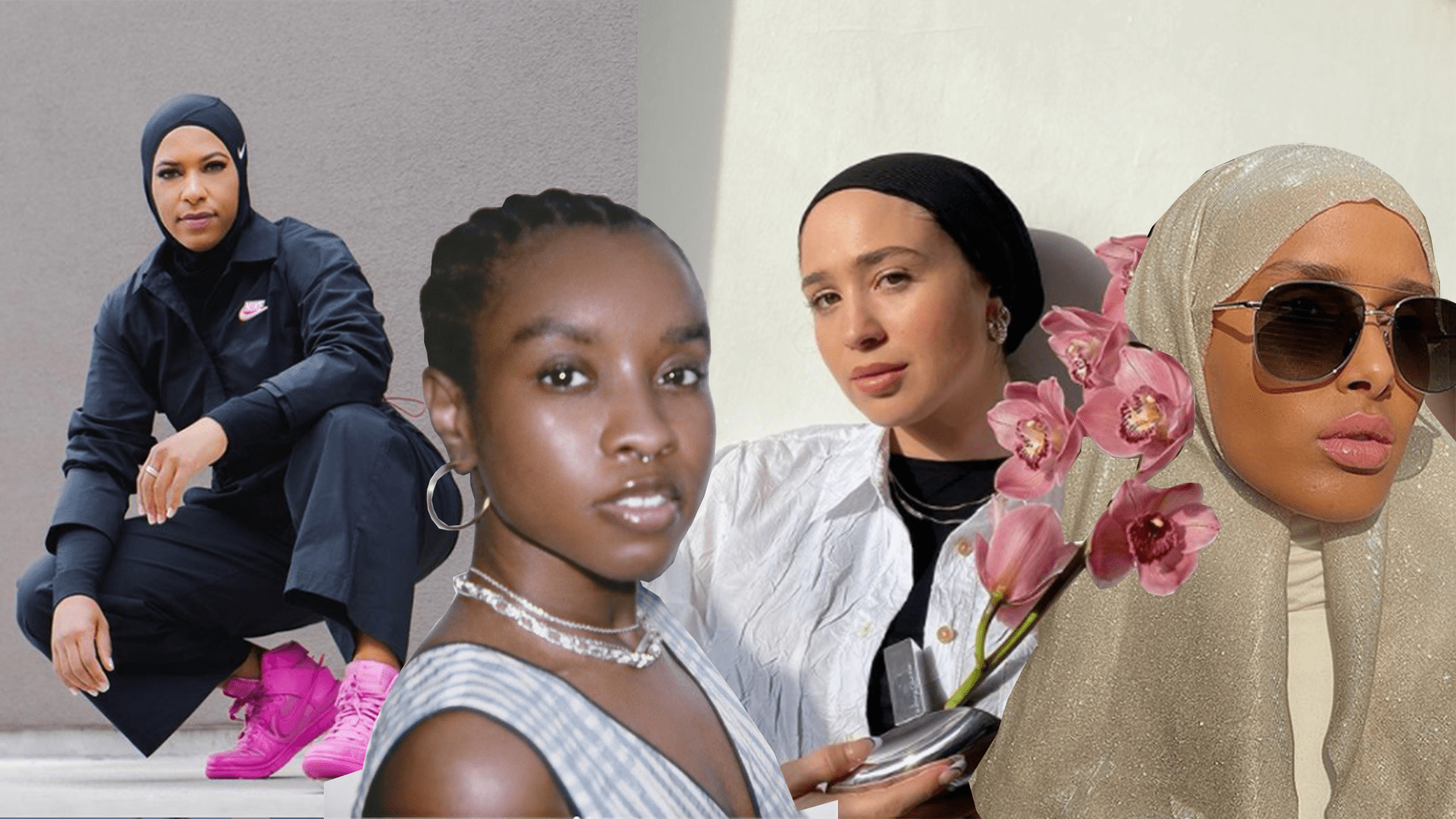Generation Black TV - Live
Modest Fashion In The Month Of Ramadan: #inspiregood Panel Discussion
[vc_row type=”in_container” full_screen_row_position=”middle” column_margin=”default” column_direction=”default” column_direction_tablet=”default” column_direction_phone=”default” scene_position=”center” top_padding=”5%” text_color=”dark” text_align=”left” row_border_radius=”none” row_border_radius_applies=”bg” overlay_strength=”0.3″ gradient_direction=”left_to_right” shape_divider_position=”bottom” bg_image_animation=”none” shape_type=””][vc_column column_padding=”no-extra-padding” column_padding_tablet=”inherit” column_padding_phone=”inherit” column_padding_position=”all” background_color_opacity=”1″ background_hover_color_opacity=”1″ column_shadow=”none” column_border_radius=”none” column_link_target=”_self” gradient_direction=”left_to_right” overlay_strength=”0.3″ width=”1/1″ tablet_width_inherit=”default” tablet_text_alignment=”default” phone_text_alignment=”default” column_border_width=”none” column_border_style=”solid” bg_image_animation=”none”][vc_raw_html]JTNDc2NyaXB0JTIwdHlwZSUzRCUyMnRleHQlMkZqYXZhc2NyaXB0JTIyJTNFZG9jdW1lbnQuQnJpZElmcmFtZUJ1cnN0JTNEdHJ1ZSUzQiUzQyUyRnNjcmlwdCUzRSUyMCUzQ3NjcmlwdCUyMHR5cGUlM0QlMjJ0ZXh0JTJGamF2YXNjcmlwdCUyMiUzRSUyMHZhciUyMF9ib3MlMjAlM0QlMjBfYm9zJTdDJTdDJTVCJTVEJTNCJTIwX2Jvcy5wdXNoJTI4JTdCJTIwJTIyZGl2JTIyJTNBJTIwJTIyQnJpZF8xMDczMjM4MiUyMiUyQyUyMCUyMm9iaiUyMiUzQSUyMCU3QiUyMmlkJTIyJTNBJTIyMTU2OTIlMjIlMkMlMjJ3aWR0aCUyMiUzQSUyMjMwMCUyMiUyQyUyMmhlaWdodCUyMiUzQSUyMjI1MCUyMiU3RCUyMCU3RCUyOSUzQiUyMCUzQyUyRnNjcmlwdCUzRSUyMCUzQ3NjcmlwdCUyMHR5cGUlM0QlMjJ0ZXh0JTJGamF2YXNjcmlwdCUyMiUyMGFzeW5jJTIwc3JjJTNEJTIyJTJGJTJGc2VydmljZXMuYnJpZC50diUyRnBsYXllciUyRmJ1aWxkJTJGYnJpZC5vdXRzdHJlYW0ubWluLmpzJTIyJTNFJTNDJTJGc2NyaXB0JTNF[/vc_raw_html][vc_raw_js]JTNDJTIxLS0lMjBDaGFwdGVyWl85NzB4MjUwJTIwJTVCYXN5bmMlNUQlMjAtLSUzRSUwQSUzQ3NjcmlwdCUyMHR5cGUlM0QlMjJ0ZXh0JTJGamF2YXNjcmlwdCUyMiUzRWlmJTIwJTI4JTIxd2luZG93LkFkQnV0bGVyJTI5JTdCJTI4ZnVuY3Rpb24lMjglMjklN0J2YXIlMjBzJTIwJTNEJTIwZG9jdW1lbnQuY3JlYXRlRWxlbWVudCUyOCUyMnNjcmlwdCUyMiUyOSUzQiUyMHMuYXN5bmMlMjAlM0QlMjB0cnVlJTNCJTIwcy50eXBlJTIwJTNEJTIwJTIydGV4dCUyRmphdmFzY3JpcHQlMjIlM0JzLnNyYyUyMCUzRCUyMCUyN2h0dHBzJTNBJTJGJTJGYWRzLmJyYW5kYWR2YW5jZS5jby51ayUyRmFwcC5qcyUyNyUzQnZhciUyMG4lMjAlM0QlMjBkb2N1bWVudC5nZXRFbGVtZW50c0J5VGFnTmFtZSUyOCUyMnNjcmlwdCUyMiUyOSU1QjAlNUQlM0IlMjBuLnBhcmVudE5vZGUuaW5zZXJ0QmVmb3JlJTI4cyUyQyUyMG4lMjklM0IlN0QlMjglMjklMjklM0IlN0QlM0MlMkZzY3JpcHQlM0UlMEElM0NzY3JpcHQlMjB0eXBlJTNEJTIydGV4dCUyRmphdmFzY3JpcHQlMjIlM0UlMEF2YXIlMjBBZEJ1dGxlciUyMCUzRCUyMEFkQnV0bGVyJTIwJTdDJTdDJTIwJTdCJTdEJTNCJTIwQWRCdXRsZXIuYWRzJTIwJTNEJTIwQWRCdXRsZXIuYWRzJTIwJTdDJTdDJTIwJTVCJTVEJTNCJTBBQWRCdXRsZXIuYWRzLnB1c2glMjhmdW5jdGlvbiUyOCUyOSUyMCU3QiUyMEFkQnV0bGVyLmVuYWJsZUNvbnNlbnRNYW5hZ2VtZW50JTI4JTI5JTNCJTIwJTdEJTI5JTNCJTBBdmFyJTIwYWJrdyUyMCUzRCUyMHdpbmRvdy5hYmt3JTIwJTdDJTdDJTIwJTI3JTI3JTNCJTBBdmFyJTIwcGxjNDUzMTE2JTIwJTNEJTIwd2luZG93LnBsYzQ1MzExNiUyMCU3QyU3QyUyMDAlM0IlMEFkb2N1bWVudC53cml0ZSUyOCUyNyUzQyUyNyUyQiUyN2RpdiUyMGlkJTNEJTIycGxhY2VtZW50XzQ1MzExNl8lMjclMkJwbGM0NTMxMTYlMkIlMjclMjIlM0UlM0MlMkYlMjclMkIlMjdkaXYlM0UlMjclMjklM0IlMEFBZEJ1dGxlci5hZHMucHVzaCUyOCU3QmhhbmRsZXIlM0ElMjBmdW5jdGlvbiUyOG9wdCUyOSU3QiUyMEFkQnV0bGVyLnJlZ2lzdGVyJTI4MTc1MDkyJTJDJTIwNDUzMTE2JTJDJTIwJTVCOTcwJTJDMjUwJTVEJTJDJTIwJTI3cGxhY2VtZW50XzQ1MzExNl8lMjclMkJvcHQucGxhY2UlMkMlMjBvcHQlMjklM0IlMjAlN0QlMkMlMjBvcHQlM0ElMjAlN0IlMjBwbGFjZSUzQSUyMHBsYzQ1MzExNiUyQiUyQiUyQyUyMGtleXdvcmRzJTNBJTIwYWJrdyUyQyUyMGRvbWFpbiUzQSUyMCUyN2Fkcy5icmFuZGFkdmFuY2UuY28udWslMjclMkMlMjBjbGljayUzQSUyN0NMSUNLX01BQ1JPX1BMQUNFSE9MREVSJTI3JTIwJTdEJTdEJTI5JTNCJTBBJTNDJTJGc2NyaXB0JTNF[/vc_raw_js][vc_row_inner column_margin=”default” column_direction=”default” column_direction_tablet=”default” column_direction_phone=”default” text_align=”left”][vc_column_inner column_padding=”no-extra-padding” column_padding_tablet=”inherit” column_padding_phone=”inherit” column_padding_position=”all” background_color_opacity=”1″ background_hover_color_opacity=”1″ column_shadow=”none” column_border_radius=”none” column_link_target=”_self” gradient_direction=”left_to_right” overlay_strength=”0.3″ width=”1/1″ tablet_width_inherit=”default” column_border_width=”none” column_border_style=”solid” bg_image_animation=”none”][vc_column_text el_class=”article-title”]
Modest Fashion In The Month Of Ramadan: #inspiregood Panel Discussion
[/vc_column_text][vc_column_text el_class=”article-byline”]Modest fashion and inclusion within the fashion industry was the topic of discussion during a panel as part of Facebook’s #monthofgood, hosted by Teen Vogue’s Director of Fashion and Beauty, Tahirah Hairston. [/vc_column_text][vc_column_text el_class=”article-byline, popmake-teddy-profile”]
by Hiyah Zaidi
[/vc_column_text][divider line_type=”No Line” custom_height=”40″][/vc_column_inner][/vc_row_inner][vc_row_inner column_margin=”default” column_direction=”default” column_direction_tablet=”default” column_direction_phone=”default” text_align=”left”][vc_column_inner column_padding=”no-extra-padding” column_padding_tablet=”inherit” column_padding_phone=”inherit” column_padding_position=”all” background_color_opacity=”1″ background_hover_color_opacity=”1″ column_shadow=”none” column_border_radius=”none” column_link_target=”_self” gradient_direction=”left_to_right” overlay_strength=”0.3″ width=”1/2″ tablet_width_inherit=”default” column_border_width=”none” column_border_style=”solid” bg_image_animation=”none”][image_with_animation image_url=”6120″ animation=”Fade In” hover_animation=”none” alignment=”” border_radius=”none” box_shadow=”none” image_loading=”default” max_width=”100%” max_width_mobile=”default”][vc_raw_js]JTNDJTIxLS0lMjBDaGFwdGVyJTIwWl8zMDB4MjUwX01CJTIwJTVCYXN5bmMlNUQlMjAtLSUzRSUwQSUzQ3NjcmlwdCUyMHR5cGUlM0QlMjJ0ZXh0JTJGamF2YXNjcmlwdCUyMiUzRWlmJTIwJTI4JTIxd2luZG93LkFkQnV0bGVyJTI5JTdCJTI4ZnVuY3Rpb24lMjglMjklN0J2YXIlMjBzJTIwJTNEJTIwZG9jdW1lbnQuY3JlYXRlRWxlbWVudCUyOCUyMnNjcmlwdCUyMiUyOSUzQiUyMHMuYXN5bmMlMjAlM0QlMjB0cnVlJTNCJTIwcy50eXBlJTIwJTNEJTIwJTIydGV4dCUyRmphdmFzY3JpcHQlMjIlM0JzLnNyYyUyMCUzRCUyMCUyN2h0dHBzJTNBJTJGJTJGYWRzLmJyYW5kYWR2YW5jZS5jby51ayUyRmFwcC5qcyUyNyUzQnZhciUyMG4lMjAlM0QlMjBkb2N1bWVudC5nZXRFbGVtZW50c0J5VGFnTmFtZSUyOCUyMnNjcmlwdCUyMiUyOSU1QjAlNUQlM0IlMjBuLnBhcmVudE5vZGUuaW5zZXJ0QmVmb3JlJTI4cyUyQyUyMG4lMjklM0IlN0QlMjglMjklMjklM0IlN0QlM0MlMkZzY3JpcHQlM0UlMEElM0NzY3JpcHQlMjB0eXBlJTNEJTIydGV4dCUyRmphdmFzY3JpcHQlMjIlM0UlMEF2YXIlMjBBZEJ1dGxlciUyMCUzRCUyMEFkQnV0bGVyJTIwJTdDJTdDJTIwJTdCJTdEJTNCJTIwQWRCdXRsZXIuYWRzJTIwJTNEJTIwQWRCdXRsZXIuYWRzJTIwJTdDJTdDJTIwJTVCJTVEJTNCJTBBQWRCdXRsZXIuYWRzLnB1c2glMjhmdW5jdGlvbiUyOCUyOSUyMCU3QiUyMEFkQnV0bGVyLmVuYWJsZUNvbnNlbnRNYW5hZ2VtZW50JTI4JTI5JTNCJTIwJTdEJTI5JTNCJTBBdmFyJTIwYWJrdyUyMCUzRCUyMHdpbmRvdy5hYmt3JTIwJTdDJTdDJTIwJTI3JTI3JTNCJTBBdmFyJTIwcGxjNDUzMTE4JTIwJTNEJTIwd2luZG93LnBsYzQ1MzExOCUyMCU3QyU3QyUyMDAlM0IlMEFkb2N1bWVudC53cml0ZSUyOCUyNyUzQyUyNyUyQiUyN2RpdiUyMGlkJTNEJTIycGxhY2VtZW50XzQ1MzExOF8lMjclMkJwbGM0NTMxMTglMkIlMjclMjIlM0UlM0MlMkYlMjclMkIlMjdkaXYlM0UlMjclMjklM0IlMEFBZEJ1dGxlci5hZHMucHVzaCUyOCU3QmhhbmRsZXIlM0ElMjBmdW5jdGlvbiUyOG9wdCUyOSU3QiUyMEFkQnV0bGVyLnJlZ2lzdGVyJTI4MTc1MDkyJTJDJTIwNDUzMTE4JTJDJTIwJTVCMzAwJTJDMjUwJTVEJTJDJTIwJTI3cGxhY2VtZW50XzQ1MzExOF8lMjclMkJvcHQucGxhY2UlMkMlMjBvcHQlMjklM0IlMjAlN0QlMkMlMjBvcHQlM0ElMjAlN0IlMjBwbGFjZSUzQSUyMHBsYzQ1MzExOCUyQiUyQiUyQyUyMGtleXdvcmRzJTNBJTIwYWJrdyUyQyUyMGRvbWFpbiUzQSUyMCUyN2Fkcy5icmFuZGFkdmFuY2UuY28udWslMjclMkMlMjBjbGljayUzQSUyN0NMSUNLX01BQ1JPX1BMQUNFSE9MREVSJTI3JTIwJTdEJTdEJTI5JTNCJTBBJTNDJTJGc2NyaXB0JTNFJTBB[/vc_raw_js][/vc_column_inner][vc_column_inner column_padding=”no-extra-padding” column_padding_tablet=”inherit” column_padding_phone=”inherit” column_padding_position=”all” background_color_opacity=”1″ background_hover_color_opacity=”1″ column_shadow=”none” column_border_radius=”none” column_link_target=”_self” gradient_direction=”left_to_right” overlay_strength=”0.3″ width=”1/2″ tablet_width_inherit=”default” column_border_width=”none” column_border_style=”solid” bg_image_animation=”none”][vc_column_text]On the 30th April 2021, three inspiring women sat down to discuss all things modest fashion. Tahirah Hairston, Teen Vogue’s Director of Fashion and Beauty hosts a panel with three big names in the modest fashion industry: Rawdah Mohamed, a model featured in publications such as Vogue, Elle and I-D, Maria Alia, a model and content creator and Ibtihaj Muhammad, an author, activist, entrepreneur, and Olympic Bronze medallist.
In an intimate half hour talk, they examined and explained how modest fashion has shaped their lives and the importance fashion had in relation to their identity. Modest fashion boosted in popularity in 2016, when Turkey held its first ever Fashion Week dedicated solely to modest fashion.
Similar big waves were made in the New York Fashion Week, 2016, when designer Anniesa Hasibuan debuted a stunning modest fashion collection with models adorned in corresponding hijabs.[/vc_column_text][/vc_column_inner][/vc_row_inner][vc_row_inner column_margin=”default” column_direction=”default” column_direction_tablet=”default” column_direction_phone=”default” text_align=”left”][vc_column_inner column_padding=”no-extra-padding” column_padding_tablet=”inherit” column_padding_phone=”inherit” column_padding_position=”all” background_color_opacity=”1″ background_hover_color_opacity=”1″ column_shadow=”none” column_border_radius=”none” column_link_target=”_self” gradient_direction=”left_to_right” overlay_strength=”0.3″ width=”1/2″ tablet_width_inherit=”default” column_border_width=”none” column_border_style=”solid” bg_image_animation=”none”][vc_column_text]As social media gained traction and became a crucial part of our everyday lives, figures like Muhammad, Alia and Mohammad took to their platforms to promote positivity towards modest fashion. They soon amassed a following spanning thousands and have since blossomed into the inspirational and powerful women we see today.
Modest fashion is mostly associated with people who wear the hijab, but really it’s about covering up according to Islamic principles, whether you wear a hijab or not.
The month of Ramadan is a holy time for Muslims across the globe making now the perfect time to reflect back on Islamic values and examine how they collide within our society. Hairston’s panellists immediately discuss how Ramadan is a month about togetherness and family, and how the month itself accentuates an appreciation of something bigger than ourselves.
But the pandemic left things in disarray, shaken against the norm – which means adaptability is now required. Regarding this, Mohamed mentions how this time could be perfect to revisit your spiritual side and reconnect with yourself, if you can’t be with family, you can learn how to be with yourself. [/vc_column_text][/vc_column_inner][vc_column_inner column_padding=”no-extra-padding” column_padding_tablet=”inherit” column_padding_phone=”inherit” column_padding_position=”all” background_color_opacity=”1″ background_hover_color_opacity=”1″ column_shadow=”none” column_border_radius=”none” column_link_target=”_self” gradient_direction=”left_to_right” overlay_strength=”0.3″ width=”1/2″ tablet_width_inherit=”default” column_border_width=”none” column_border_style=”solid” bg_image_animation=”none”][vc_raw_js]JTNDYmxvY2txdW90ZSUyMGNsYXNzJTNEJTIyaW5zdGFncmFtLW1lZGlhJTIyJTIwZGF0YS1pbnN0Z3JtLXBlcm1hbGluayUzRCUyMmh0dHBzJTNBJTJGJTJGd3d3Lmluc3RhZ3JhbS5jb20lMkZwJTJGQ0o2WDZpU2dSTWslMkYlM0Z1dG1fc291cmNlJTNEaWdfZW1iZWQlMjZhbXAlM0J1dG1fY2FtcGFpZ24lM0Rsb2FkaW5nJTIyJTIwZGF0YS1pbnN0Z3JtLXZlcnNpb24lM0QlMjIxMyUyMiUyMHN0eWxlJTNEJTIyJTIwYmFja2dyb3VuZCUzQSUyM0ZGRiUzQiUyMGJvcmRlciUzQTAlM0IlMjBib3JkZXItcmFkaXVzJTNBM3B4JTNCJTIwYm94LXNoYWRvdyUzQTAlMjAwJTIwMXB4JTIwMCUyMHJnYmElMjgwJTJDMCUyQzAlMkMwLjUlMjklMkMwJTIwMXB4JTIwMTBweCUyMDAlMjByZ2JhJTI4MCUyQzAlMkMwJTJDMC4xNSUyOSUzQiUyMG1hcmdpbiUzQSUyMDFweCUzQiUyMG1heC13aWR0aCUzQTU0MHB4JTNCJTIwbWluLXdpZHRoJTNBMzI2cHglM0IlMjBwYWRkaW5nJTNBMCUzQiUyMHdpZHRoJTNBOTkuMzc1JTI1JTNCJTIwd2lkdGglM0Etd2Via2l0LWNhbGMlMjgxMDAlMjUlMjAtJTIwMnB4JTI5JTNCJTIwd2lkdGglM0FjYWxjJTI4MTAwJTI1JTIwLSUyMDJweCUyOSUzQiUyMiUzRSUzQ2RpdiUyMHN0eWxlJTNEJTIycGFkZGluZyUzQTE2cHglM0IlMjIlM0UlMjAlM0NhJTIwaHJlZiUzRCUyMmh0dHBzJTNBJTJGJTJGd3d3Lmluc3RhZ3JhbS5jb20lMkZwJTJGQ0o2WDZpU2dSTWslMkYlM0Z1dG1fc291cmNlJTNEaWdfZW1iZWQlMjZhbXAlM0J1dG1fY2FtcGFpZ24lM0Rsb2FkaW5nJTIyJTIwc3R5bGUlM0QlMjIlMjBiYWNrZ3JvdW5kJTNBJTIzRkZGRkZGJTNCJTIwbGluZS1oZWlnaHQlM0EwJTNCJTIwcGFkZGluZyUzQTAlMjAwJTNCJTIwdGV4dC1hbGlnbiUzQWNlbnRlciUzQiUyMHRleHQtZGVjb3JhdGlvbiUzQW5vbmUlM0IlMjB3aWR0aCUzQTEwMCUyNSUzQiUyMiUyMHRhcmdldCUzRCUyMl9ibGFuayUyMiUzRSUyMCUzQ2RpdiUyMHN0eWxlJTNEJTIyJTIwZGlzcGxheSUzQSUyMGZsZXglM0IlMjBmbGV4LWRpcmVjdGlvbiUzQSUyMHJvdyUzQiUyMGFsaWduLWl0ZW1zJTNBJTIwY2VudGVyJTNCJTIyJTNFJTIwJTNDZGl2JTIwc3R5bGUlM0QlMjJiYWNrZ3JvdW5kLWNvbG9yJTNBJTIwJTIzRjRGNEY0JTNCJTIwYm9yZGVyLXJhZGl1cyUzQSUyMDUwJTI1JTNCJTIwZmxleC1ncm93JTNBJTIwMCUzQiUyMGhlaWdodCUzQSUyMDQwcHglM0IlMjBtYXJnaW4tcmlnaHQlM0ElMjAxNHB4JTNCJTIwd2lkdGglM0ElMjA0MHB4JTNCJTIyJTNFJTNDJTJGZGl2JTNFJTIwJTNDZGl2JTIwc3R5bGUlM0QlMjJkaXNwbGF5JTNBJTIwZmxleCUzQiUyMGZsZXgtZGlyZWN0aW9uJTNBJTIwY29sdW1uJTNCJTIwZmxleC1ncm93JTNBJTIwMSUzQiUyMGp1c3RpZnktY29udGVudCUzQSUyMGNlbnRlciUzQiUyMiUzRSUyMCUzQ2RpdiUyMHN0eWxlJTNEJTIyJTIwYmFja2dyb3VuZC1jb2xvciUzQSUyMCUyM0Y0RjRGNCUzQiUyMGJvcmRlci1yYWRpdXMlM0ElMjA0cHglM0IlMjBmbGV4LWdyb3clM0ElMjAwJTNCJTIwaGVpZ2h0JTNBJTIwMTRweCUzQiUyMG1hcmdpbi1ib3R0b20lM0ElMjA2cHglM0IlMjB3aWR0aCUzQSUyMDEwMHB4JTNCJTIyJTNFJTNDJTJGZGl2JTNFJTIwJTNDZGl2JTIwc3R5bGUlM0QlMjIlMjBiYWNrZ3JvdW5kLWNvbG9yJTNBJTIwJTIzRjRGNEY0JTNCJTIwYm9yZGVyLXJhZGl1cyUzQSUyMDRweCUzQiUyMGZsZXgtZ3JvdyUzQSUyMDAlM0IlMjBoZWlnaHQlM0ElMjAxNHB4JTNCJTIwd2lkdGglM0ElMjA2MHB4JTNCJTIyJTNFJTNDJTJGZGl2JTNFJTNDJTJGZGl2JTNFJTNDJTJGZGl2JTNFJTNDZGl2JTIwc3R5bGUlM0QlMjJwYWRkaW5nJTNBJTIwMTklMjUlMjAwJTNCJTIyJTNFJTNDJTJGZGl2JTNFJTIwJTNDZGl2JTIwc3R5bGUlM0QlMjJkaXNwbGF5JTNBYmxvY2slM0IlMjBoZWlnaHQlM0E1MHB4JTNCJTIwbWFyZ2luJTNBMCUyMGF1dG8lMjAxMnB4JTNCJTIwd2lkdGglM0E1MHB4JTNCJTIyJTNFJTNDc3ZnJTIwd2lkdGglM0QlMjI1MHB4JTIyJTIwaGVpZ2h0JTNEJTIyNTBweCUyMiUyMHZpZXdCb3glM0QlMjIwJTIwMCUyMDYwJTIwNjAlMjIlMjB2ZXJzaW9uJTNEJTIyMS4xJTIyJTIweG1sbnMlM0QlMjJodHRwcyUzQSUyRiUyRnd3dy53My5vcmclMkYyMDAwJTJGc3ZnJTIyJTIweG1sbnMlM0F4bGluayUzRCUyMmh0dHBzJTNBJTJGJTJGd3d3LnczLm9yZyUyRjE5OTklMkZ4bGluayUyMiUzRSUzQ2clMjBzdHJva2UlM0QlMjJub25lJTIyJTIwc3Ryb2tlLXdpZHRoJTNEJTIyMSUyMiUyMGZpbGwlM0QlMjJub25lJTIyJTIwZmlsbC1ydWxlJTNEJTIyZXZlbm9kZCUyMiUzRSUzQ2clMjB0cmFuc2Zvcm0lM0QlMjJ0cmFuc2xhdGUlMjgtNTExLjAwMDAwMCUyQyUyMC0yMC4wMDAwMDAlMjklMjIlMjBmaWxsJTNEJTIyJTIzMDAwMDAwJTIyJTNFJTNDZyUzRSUzQ3BhdGglMjBkJTNEJTIyTTU1Ni44NjklMkMzMC40MSUyMEM1NTQuODE0JTJDMzAuNDElMjA1NTMuMTQ4JTJDMzIuMDc2JTIwNTUzLjE0OCUyQzM0LjEzMSUyMEM1NTMuMTQ4JTJDMzYuMTg2JTIwNTU0LjgxNCUyQzM3Ljg1MiUyMDU1Ni44NjklMkMzNy44NTIlMjBDNTU4LjkyNCUyQzM3Ljg1MiUyMDU2MC41OSUyQzM2LjE4NiUyMDU2MC41OSUyQzM0LjEzMSUyMEM1NjAuNTklMkMzMi4wNzYlMjA1NTguOTI0JTJDMzAuNDElMjA1NTYuODY5JTJDMzAuNDElMjBNNTQxJTJDNjAuNjU3JTIwQzUzNS4xMTQlMkM2MC42NTclMjA1MzAuMzQyJTJDNTUuODg3JTIwNTMwLjM0MiUyQzUwJTIwQzUzMC4zNDIlMkM0NC4xMTQlMjA1MzUuMTE0JTJDMzkuMzQyJTIwNTQxJTJDMzkuMzQyJTIwQzU0Ni44ODclMkMzOS4zNDIlMjA1NTEuNjU4JTJDNDQuMTE0JTIwNTUxLjY1OCUyQzUwJTIwQzU1MS42NTglMkM1NS44ODclMjA1NDYuODg3JTJDNjAuNjU3JTIwNTQxJTJDNjAuNjU3JTIwTTU0MSUyQzMzLjg4NiUyMEM1MzIuMSUyQzMzLjg4NiUyMDUyNC44ODYlMkM0MS4xJTIwNTI0Ljg4NiUyQzUwJTIwQzUyNC44ODYlMkM1OC44OTklMjA1MzIuMSUyQzY2LjExMyUyMDU0MSUyQzY2LjExMyUyMEM1NDkuOSUyQzY2LjExMyUyMDU1Ny4xMTUlMkM1OC44OTklMjA1NTcuMTE1JTJDNTAlMjBDNTU3LjExNSUyQzQxLjElMjA1NDkuOSUyQzMzLjg4NiUyMDU0MSUyQzMzLjg4NiUyME01NjUuMzc4JTJDNjIuMTAxJTIwQzU2NS4yNDQlMkM2NS4wMjIlMjA1NjQuNzU2JTJDNjYuNjA2JTIwNTY0LjM0NiUyQzY3LjY2MyUyMEM1NjMuODAzJTJDNjkuMDYlMjA1NjMuMTU0JTJDNzAuMDU3JTIwNTYyLjEwNiUyQzcxLjEwNiUyMEM1NjEuMDU4JTJDNzIuMTU1JTIwNTYwLjA2JTJDNzIuODAzJTIwNTU4LjY2MiUyQzczLjM0NyUyMEM1NTcuNjA3JTJDNzMuNzU3JTIwNTU2LjAyMSUyQzc0LjI0NCUyMDU1My4xMDIlMkM3NC4zNzglMjBDNTQ5Ljk0NCUyQzc0LjUyMSUyMDU0OC45OTclMkM3NC41NTIlMjA1NDElMkM3NC41NTIlMjBDNTMzLjAwMyUyQzc0LjU1MiUyMDUzMi4wNTYlMkM3NC41MjElMjA1MjguODk4JTJDNzQuMzc4JTIwQzUyNS45NzklMkM3NC4yNDQlMjA1MjQuMzkzJTJDNzMuNzU3JTIwNTIzLjMzOCUyQzczLjM0NyUyMEM1MjEuOTQlMkM3Mi44MDMlMjA1MjAuOTQyJTJDNzIuMTU1JTIwNTE5Ljg5NCUyQzcxLjEwNiUyMEM1MTguODQ2JTJDNzAuMDU3JTIwNTE4LjE5NyUyQzY5LjA2JTIwNTE3LjY1NCUyQzY3LjY2MyUyMEM1MTcuMjQ0JTJDNjYuNjA2JTIwNTE2Ljc1NSUyQzY1LjAyMiUyMDUxNi42MjMlMkM2Mi4xMDElMjBDNTE2LjQ3OSUyQzU4Ljk0MyUyMDUxNi40NDglMkM1Ny45OTYlMjA1MTYuNDQ4JTJDNTAlMjBDNTE2LjQ0OCUyQzQyLjAwMyUyMDUxNi40NzklMkM0MS4wNTYlMjA1MTYuNjIzJTJDMzcuODk5JTIwQzUxNi43NTUlMkMzNC45NzglMjA1MTcuMjQ0JTJDMzMuMzkxJTIwNTE3LjY1NCUyQzMyLjMzOCUyMEM1MTguMTk3JTJDMzAuOTM4JTIwNTE4Ljg0NiUyQzI5Ljk0MiUyMDUxOS44OTQlMkMyOC44OTQlMjBDNTIwLjk0MiUyQzI3Ljg0NiUyMDUyMS45NCUyQzI3LjE5NiUyMDUyMy4zMzglMkMyNi42NTQlMjBDNTI0LjM5MyUyQzI2LjI0NCUyMDUyNS45NzklMkMyNS43NTYlMjA1MjguODk4JTJDMjUuNjIzJTIwQzUzMi4wNTclMkMyNS40NzklMjA1MzMuMDA0JTJDMjUuNDQ4JTIwNTQxJTJDMjUuNDQ4JTIwQzU0OC45OTclMkMyNS40NDglMjA1NDkuOTQzJTJDMjUuNDc5JTIwNTUzLjEwMiUyQzI1LjYyMyUyMEM1NTYuMDIxJTJDMjUuNzU2JTIwNTU3LjYwNyUyQzI2LjI0NCUyMDU1OC42NjIlMkMyNi42NTQlMjBDNTYwLjA2JTJDMjcuMTk2JTIwNTYxLjA1OCUyQzI3Ljg0NiUyMDU2Mi4xMDYlMkMyOC44OTQlMjBDNTYzLjE1NCUyQzI5Ljk0MiUyMDU2My44MDMlMkMzMC45MzglMjA1NjQuMzQ2JTJDMzIuMzM4JTIwQzU2NC43NTYlMkMzMy4zOTElMjA1NjUuMjQ0JTJDMzQuOTc4JTIwNTY1LjM3OCUyQzM3Ljg5OSUyMEM1NjUuNTIyJTJDNDEuMDU2JTIwNTY1LjU1MiUyQzQyLjAwMyUyMDU2NS41NTIlMkM1MCUyMEM1NjUuNTUyJTJDNTcuOTk2JTIwNTY1LjUyMiUyQzU4Ljk0MyUyMDU2NS4zNzglMkM2Mi4xMDElMjBNNTcwLjgyJTJDMzcuNjMxJTIwQzU3MC42NzQlMkMzNC40MzglMjA1NzAuMTY3JTJDMzIuMjU4JTIwNTY5LjQyNSUyQzMwLjM0OSUyMEM1NjguNjU5JTJDMjguMzc3JTIwNTY3LjYzMyUyQzI2LjcwMiUyMDU2NS45NjUlMkMyNS4wMzUlMjBDNTY0LjI5NyUyQzIzLjM2OCUyMDU2Mi42MjMlMkMyMi4zNDIlMjA1NjAuNjUyJTJDMjEuNTc1JTIwQzU1OC43NDMlMkMyMC44MzQlMjA1NTYuNTYyJTJDMjAuMzI2JTIwNTUzLjM2OSUyQzIwLjE4JTIwQzU1MC4xNjklMkMyMC4wMzMlMjA1NDkuMTQ4JTJDMjAlMjA1NDElMkMyMCUyMEM1MzIuODUzJTJDMjAlMjA1MzEuODMxJTJDMjAuMDMzJTIwNTI4LjYzMSUyQzIwLjE4JTIwQzUyNS40MzglMkMyMC4zMjYlMjA1MjMuMjU3JTJDMjAuODM0JTIwNTIxLjM0OSUyQzIxLjU3NSUyMEM1MTkuMzc2JTJDMjIuMzQyJTIwNTE3LjcwMyUyQzIzLjM2OCUyMDUxNi4wMzUlMkMyNS4wMzUlMjBDNTE0LjM2OCUyQzI2LjcwMiUyMDUxMy4zNDIlMkMyOC4zNzclMjA1MTIuNTc0JTJDMzAuMzQ5JTIwQzUxMS44MzQlMkMzMi4yNTglMjA1MTEuMzI2JTJDMzQuNDM4JTIwNTExLjE4MSUyQzM3LjYzMSUyMEM1MTEuMDM1JTJDNDAuODMxJTIwNTExJTJDNDEuODUxJTIwNTExJTJDNTAlMjBDNTExJTJDNTguMTQ3JTIwNTExLjAzNSUyQzU5LjE3JTIwNTExLjE4MSUyQzYyLjM2OSUyMEM1MTEuMzI2JTJDNjUuNTYyJTIwNTExLjgzNCUyQzY3Ljc0MyUyMDUxMi41NzQlMkM2OS42NTElMjBDNTEzLjM0MiUyQzcxLjYyNSUyMDUxNC4zNjglMkM3My4yOTYlMjA1MTYuMDM1JTJDNzQuOTY1JTIwQzUxNy43MDMlMkM3Ni42MzQlMjA1MTkuMzc2JTJDNzcuNjU4JTIwNTIxLjM0OSUyQzc4LjQyNSUyMEM1MjMuMjU3JTJDNzkuMTY3JTIwNTI1LjQzOCUyQzc5LjY3MyUyMDUyOC42MzElMkM3OS44MiUyMEM1MzEuODMxJTJDNzkuOTY1JTIwNTMyLjg1MyUyQzgwLjAwMSUyMDU0MSUyQzgwLjAwMSUyMEM1NDkuMTQ4JTJDODAuMDAxJTIwNTUwLjE2OSUyQzc5Ljk2NSUyMDU1My4zNjklMkM3OS44MiUyMEM1NTYuNTYyJTJDNzkuNjczJTIwNTU4Ljc0MyUyQzc5LjE2NyUyMDU2MC42NTIlMkM3OC40MjUlMjBDNTYyLjYyMyUyQzc3LjY1OCUyMDU2NC4yOTclMkM3Ni42MzQlMjA1NjUuOTY1JTJDNzQuOTY1JTIwQzU2Ny42MzMlMkM3My4yOTYlMjA1NjguNjU5JTJDNzEuNjI1JTIwNTY5LjQyNSUyQzY5LjY1MSUyMEM1NzAuMTY3JTJDNjcuNzQzJTIwNTcwLjY3NCUyQzY1LjU2MiUyMDU3MC44MiUyQzYyLjM2OSUyMEM1NzAuOTY2JTJDNTkuMTclMjA1NzElMkM1OC4xNDclMjA1NzElMkM1MCUyMEM1NzElMkM0MS44NTElMjA1NzAuOTY2JTJDNDAuODMxJTIwNTcwLjgyJTJDMzcuNjMxJTIyJTNFJTNDJTJGcGF0aCUzRSUzQyUyRmclM0UlM0MlMkZnJTNFJTNDJTJGZyUzRSUzQyUyRnN2ZyUzRSUzQyUyRmRpdiUzRSUzQ2RpdiUyMHN0eWxlJTNEJTIycGFkZGluZy10b3AlM0ElMjA4cHglM0IlMjIlM0UlMjAlM0NkaXYlMjBzdHlsZSUzRCUyMiUyMGNvbG9yJTNBJTIzMzg5N2YwJTNCJTIwZm9udC1mYW1pbHklM0FBcmlhbCUyQ3NhbnMtc2VyaWYlM0IlMjBmb250LXNpemUlM0ExNHB4JTNCJTIwZm9udC1zdHlsZSUzQW5vcm1hbCUzQiUyMGZvbnQtd2VpZ2h0JTNBNTUwJTNCJTIwbGluZS1oZWlnaHQlM0ExOHB4JTNCJTIyJTNFJTIwVmlldyUyMHRoaXMlMjBwb3N0JTIwb24lMjBJbnN0YWdyYW0lM0MlMkZkaXYlM0UlM0MlMkZkaXYlM0UlM0NkaXYlMjBzdHlsZSUzRCUyMnBhZGRpbmclM0ElMjAxMi41JTI1JTIwMCUzQiUyMiUzRSUzQyUyRmRpdiUzRSUyMCUzQ2RpdiUyMHN0eWxlJTNEJTIyZGlzcGxheSUzQSUyMGZsZXglM0IlMjBmbGV4LWRpcmVjdGlvbiUzQSUyMHJvdyUzQiUyMG1hcmdpbi1ib3R0b20lM0ElMjAxNHB4JTNCJTIwYWxpZ24taXRlbXMlM0ElMjBjZW50ZXIlM0IlMjIlM0UlM0NkaXYlM0UlMjAlM0NkaXYlMjBzdHlsZSUzRCUyMmJhY2tncm91bmQtY29sb3IlM0ElMjAlMjNGNEY0RjQlM0IlMjBib3JkZXItcmFkaXVzJTNBJTIwNTAlMjUlM0IlMjBoZWlnaHQlM0ElMjAxMi41cHglM0IlMjB3aWR0aCUzQSUyMDEyLjVweCUzQiUyMHRyYW5zZm9ybSUzQSUyMHRyYW5zbGF0ZVglMjgwcHglMjklMjB0cmFuc2xhdGVZJTI4N3B4JTI5JTNCJTIyJTNFJTNDJTJGZGl2JTNFJTIwJTNDZGl2JTIwc3R5bGUlM0QlMjJiYWNrZ3JvdW5kLWNvbG9yJTNBJTIwJTIzRjRGNEY0JTNCJTIwaGVpZ2h0JTNBJTIwMTIuNXB4JTNCJTIwdHJhbnNmb3JtJTNBJTIwcm90YXRlJTI4LTQ1ZGVnJTI5JTIwdHJhbnNsYXRlWCUyODNweCUyOSUyMHRyYW5zbGF0ZVklMjgxcHglMjklM0IlMjB3aWR0aCUzQSUyMDEyLjVweCUzQiUyMGZsZXgtZ3JvdyUzQSUyMDAlM0IlMjBtYXJnaW4tcmlnaHQlM0ElMjAxNHB4JTNCJTIwbWFyZ2luLWxlZnQlM0ElMjAycHglM0IlMjIlM0UlM0MlMkZkaXYlM0UlMjAlM0NkaXYlMjBzdHlsZSUzRCUyMmJhY2tncm91bmQtY29sb3IlM0ElMjAlMjNGNEY0RjQlM0IlMjBib3JkZXItcmFkaXVzJTNBJTIwNTAlMjUlM0IlMjBoZWlnaHQlM0ElMjAxMi41cHglM0IlMjB3aWR0aCUzQSUyMDEyLjVweCUzQiUyMHRyYW5zZm9ybSUzQSUyMHRyYW5zbGF0ZVglMjg5cHglMjklMjB0cmFuc2xhdGVZJTI4LTE4cHglMjklM0IlMjIlM0UlM0MlMkZkaXYlM0UlM0MlMkZkaXYlM0UlM0NkaXYlMjBzdHlsZSUzRCUyMm1hcmdpbi1sZWZ0JTNBJTIwOHB4JTNCJTIyJTNFJTIwJTNDZGl2JTIwc3R5bGUlM0QlMjIlMjBiYWNrZ3JvdW5kLWNvbG9yJTNBJTIwJTIzRjRGNEY0JTNCJTIwYm9yZGVyLXJhZGl1cyUzQSUyMDUwJTI1JTNCJTIwZmxleC1ncm93JTNBJTIwMCUzQiUyMGhlaWdodCUzQSUyMDIwcHglM0IlMjB3aWR0aCUzQSUyMDIwcHglM0IlMjIlM0UlM0MlMkZkaXYlM0UlMjAlM0NkaXYlMjBzdHlsZSUzRCUyMiUyMHdpZHRoJTNBJTIwMCUzQiUyMGhlaWdodCUzQSUyMDAlM0IlMjBib3JkZXItdG9wJTNBJTIwMnB4JTIwc29saWQlMjB0cmFuc3BhcmVudCUzQiUyMGJvcmRlci1sZWZ0JTNBJTIwNnB4JTIwc29saWQlMjAlMjNmNGY0ZjQlM0IlMjBib3JkZXItYm90dG9tJTNBJTIwMnB4JTIwc29saWQlMjB0cmFuc3BhcmVudCUzQiUyMHRyYW5zZm9ybSUzQSUyMHRyYW5zbGF0ZVglMjgxNnB4JTI5JTIwdHJhbnNsYXRlWSUyOC00cHglMjklMjByb3RhdGUlMjgzMGRlZyUyOSUyMiUzRSUzQyUyRmRpdiUzRSUzQyUyRmRpdiUzRSUzQ2RpdiUyMHN0eWxlJTNEJTIybWFyZ2luLWxlZnQlM0ElMjBhdXRvJTNCJTIyJTNFJTIwJTNDZGl2JTIwc3R5bGUlM0QlMjIlMjB3aWR0aCUzQSUyMDBweCUzQiUyMGJvcmRlci10b3AlM0ElMjA4cHglMjBzb2xpZCUyMCUyM0Y0RjRGNCUzQiUyMGJvcmRlci1yaWdodCUzQSUyMDhweCUyMHNvbGlkJTIwdHJhbnNwYXJlbnQlM0IlMjB0cmFuc2Zvcm0lM0ElMjB0cmFuc2xhdGVZJTI4MTZweCUyOSUzQiUyMiUzRSUzQyUyRmRpdiUzRSUyMCUzQ2RpdiUyMHN0eWxlJTNEJTIyJTIwYmFja2dyb3VuZC1jb2xvciUzQSUyMCUyM0Y0RjRGNCUzQiUyMGZsZXgtZ3JvdyUzQSUyMDAlM0IlMjBoZWlnaHQlM0ElMjAxMnB4JTNCJTIwd2lkdGglM0ElMjAxNnB4JTNCJTIwdHJhbnNmb3JtJTNBJTIwdHJhbnNsYXRlWSUyOC00cHglMjklM0IlMjIlM0UlM0MlMkZkaXYlM0UlMjAlM0NkaXYlMjBzdHlsZSUzRCUyMiUyMHdpZHRoJTNBJTIwMCUzQiUyMGhlaWdodCUzQSUyMDAlM0IlMjBib3JkZXItdG9wJTNBJTIwOHB4JTIwc29saWQlMjAlMjNGNEY0RjQlM0IlMjBib3JkZXItbGVmdCUzQSUyMDhweCUyMHNvbGlkJTIwdHJhbnNwYXJlbnQlM0IlMjB0cmFuc2Zvcm0lM0ElMjB0cmFuc2xhdGVZJTI4LTRweCUyOSUyMHRyYW5zbGF0ZVglMjg4cHglMjklM0IlMjIlM0UlM0MlMkZkaXYlM0UlM0MlMkZkaXYlM0UlM0MlMkZkaXYlM0UlMjAlM0NkaXYlMjBzdHlsZSUzRCUyMmRpc3BsYXklM0ElMjBmbGV4JTNCJTIwZmxleC1kaXJlY3Rpb24lM0ElMjBjb2x1bW4lM0IlMjBmbGV4LWdyb3clM0ElMjAxJTNCJTIwanVzdGlmeS1jb250ZW50JTNBJTIwY2VudGVyJTNCJTIwbWFyZ2luLWJvdHRvbSUzQSUyMDI0cHglM0IlMjIlM0UlMjAlM0NkaXYlMjBzdHlsZSUzRCUyMiUyMGJhY2tncm91bmQtY29sb3IlM0ElMjAlMjNGNEY0RjQlM0IlMjBib3JkZXItcmFkaXVzJTNBJTIwNHB4JTNCJTIwZmxleC1ncm93JTNBJTIwMCUzQiUyMGhlaWdodCUzQSUyMDE0cHglM0IlMjBtYXJnaW4tYm90dG9tJTNBJTIwNnB4JTNCJTIwd2lkdGglM0ElMjAyMjRweCUzQiUyMiUzRSUzQyUyRmRpdiUzRSUyMCUzQ2RpdiUyMHN0eWxlJTNEJTIyJTIwYmFja2dyb3VuZC1jb2xvciUzQSUyMCUyM0Y0RjRGNCUzQiUyMGJvcmRlci1yYWRpdXMlM0ElMjA0cHglM0IlMjBmbGV4LWdyb3clM0ElMjAwJTNCJTIwaGVpZ2h0JTNBJTIwMTRweCUzQiUyMHdpZHRoJTNBJTIwMTQ0cHglM0IlMjIlM0UlM0MlMkZkaXYlM0UlM0MlMkZkaXYlM0UlM0MlMkZhJTNFJTNDcCUyMHN0eWxlJTNEJTIyJTIwY29sb3IlM0ElMjNjOWM4Y2QlM0IlMjBmb250LWZhbWlseSUzQUFyaWFsJTJDc2Fucy1zZXJpZiUzQiUyMGZvbnQtc2l6ZSUzQTE0cHglM0IlMjBsaW5lLWhlaWdodCUzQTE3cHglM0IlMjBtYXJnaW4tYm90dG9tJTNBMCUzQiUyMG1hcmdpbi10b3AlM0E4cHglM0IlMjBvdmVyZmxvdyUzQWhpZGRlbiUzQiUyMHBhZGRpbmclM0E4cHglMjAwJTIwN3B4JTNCJTIwdGV4dC1hbGlnbiUzQWNlbnRlciUzQiUyMHRleHQtb3ZlcmZsb3clM0FlbGxpcHNpcyUzQiUyMHdoaXRlLXNwYWNlJTNBbm93cmFwJTNCJTIyJTNFJTNDYSUyMGhyZWYlM0QlMjJodHRwcyUzQSUyRiUyRnd3dy5pbnN0YWdyYW0uY29tJTJGcCUyRkNKNlg2aVNnUk1rJTJGJTNGdXRtX3NvdXJjZSUzRGlnX2VtYmVkJTI2YW1wJTNCdXRtX2NhbXBhaWduJTNEbG9hZGluZyUyMiUyMHN0eWxlJTNEJTIyJTIwY29sb3IlM0ElMjNjOWM4Y2QlM0IlMjBmb250LWZhbWlseSUzQUFyaWFsJTJDc2Fucy1zZXJpZiUzQiUyMGZvbnQtc2l6ZSUzQTE0cHglM0IlMjBmb250LXN0eWxlJTNBbm9ybWFsJTNCJTIwZm9udC13ZWlnaHQlM0Fub3JtYWwlM0IlMjBsaW5lLWhlaWdodCUzQTE3cHglM0IlMjB0ZXh0LWRlY29yYXRpb24lM0Fub25lJTNCJTIyJTIwdGFyZ2V0JTNEJTIyX2JsYW5rJTIyJTNFQSUyMHBvc3QlMjBzaGFyZWQlMjBieSUyMFJhd2RhaCUyMCVGMCU5RiU5NSU4QSUyMCUyOCU0MHJhd2RpcyUyOSUzQyUyRmElM0UlM0MlMkZwJTNFJTNDJTJGZGl2JTNFJTNDJTJGYmxvY2txdW90ZSUzRSUyMCUzQ3NjcmlwdCUyMGFzeW5jJTIwc3JjJTNEJTIyJTJGJTJGd3d3Lmluc3RhZ3JhbS5jb20lMkZlbWJlZC5qcyUyMiUzRSUzQyUyRnNjcmlwdCUzRQ==[/vc_raw_js][/vc_column_inner][/vc_row_inner][/vc_column][/vc_row][vc_row type=”in_container” full_screen_row_position=”middle” column_margin=”none” column_direction=”default” column_direction_tablet=”default” column_direction_phone=”default” scene_position=”center” bottom_padding=”2%” text_color=”dark” text_align=”left” row_border_radius=”none” row_border_radius_applies=”bg” overlay_strength=”0.3″ gradient_direction=”left_to_right” shape_divider_position=”bottom” bg_image_animation=”none” shape_type=””][vc_column column_padding=”no-extra-padding” column_padding_tablet=”inherit” column_padding_phone=”inherit” column_padding_position=”all” top_margin=”-30px” bottom_margin=”0″ background_color_opacity=”1″ background_hover_color_opacity=”1″ column_shadow=”none” column_border_radius=”none” column_link_target=”_self” gradient_direction=”left_to_right” overlay_strength=”0.3″ width=”1/1″ tablet_width_inherit=”default” tablet_text_alignment=”default” phone_text_alignment=”default” column_border_width=”none” column_border_style=”solid” bg_image_animation=”none”][vc_row_inner column_margin=”none” column_direction=”default” column_direction_tablet=”default” column_direction_phone=”default” text_align=”left”][vc_column_inner column_padding=”no-extra-padding” column_padding_tablet=”inherit” column_padding_phone=”inherit” column_padding_position=”all” top_margin=”0″ bottom_margin=”0″ background_color_opacity=”1″ background_hover_color_opacity=”1″ column_shadow=”none” column_border_radius=”none” column_link_target=”_self” gradient_direction=”left_to_right” overlay_strength=”0.3″ width=”1/1″ tablet_width_inherit=”default” column_border_width=”none” column_border_style=”solid” bg_image_animation=”none” offset=”vc_hidden-sm vc_hidden-xs”][divider line_type=”No Line” custom_height=”20″][vc_raw_js]JTNDJTIxLS0lMjBDaGFwdGVyWl83Mjh4OTAlMjAlNUJhc3luYyU1RCUyMC0tJTNFJTBBJTNDc2NyaXB0JTIwdHlwZSUzRCUyMnRleHQlMkZqYXZhc2NyaXB0JTIyJTNFaWYlMjAlMjglMjF3aW5kb3cuQWRCdXRsZXIlMjklN0IlMjhmdW5jdGlvbiUyOCUyOSU3QnZhciUyMHMlMjAlM0QlMjBkb2N1bWVudC5jcmVhdGVFbGVtZW50JTI4JTIyc2NyaXB0JTIyJTI5JTNCJTIwcy5hc3luYyUyMCUzRCUyMHRydWUlM0IlMjBzLnR5cGUlMjAlM0QlMjAlMjJ0ZXh0JTJGamF2YXNjcmlwdCUyMiUzQnMuc3JjJTIwJTNEJTIwJTI3aHR0cHMlM0ElMkYlMkZhZHMuYnJhbmRhZHZhbmNlLmNvLnVrJTJGYXBwLmpzJTI3JTNCdmFyJTIwbiUyMCUzRCUyMGRvY3VtZW50LmdldEVsZW1lbnRzQnlUYWdOYW1lJTI4JTIyc2NyaXB0JTIyJTI5JTVCMCU1RCUzQiUyMG4ucGFyZW50Tm9kZS5pbnNlcnRCZWZvcmUlMjhzJTJDJTIwbiUyOSUzQiU3RCUyOCUyOSUyOSUzQiU3RCUzQyUyRnNjcmlwdCUzRSUwQSUzQ3NjcmlwdCUyMHR5cGUlM0QlMjJ0ZXh0JTJGamF2YXNjcmlwdCUyMiUzRSUwQXZhciUyMEFkQnV0bGVyJTIwJTNEJTIwQWRCdXRsZXIlMjAlN0MlN0MlMjAlN0IlN0QlM0IlMjBBZEJ1dGxlci5hZHMlMjAlM0QlMjBBZEJ1dGxlci5hZHMlMjAlN0MlN0MlMjAlNUIlNUQlM0IlMEFBZEJ1dGxlci5hZHMucHVzaCUyOGZ1bmN0aW9uJTI4JTI5JTIwJTdCJTIwQWRCdXRsZXIuZW5hYmxlQ29uc2VudE1hbmFnZW1lbnQlMjglMjklM0IlMjAlN0QlMjklM0IlMEF2YXIlMjBhYmt3JTIwJTNEJTIwd2luZG93LmFia3clMjAlN0MlN0MlMjAlMjclMjclM0IlMEF2YXIlMjBwbGM0NTM0NzElMjAlM0QlMjB3aW5kb3cucGxjNDUzNDcxJTIwJTdDJTdDJTIwMCUzQiUwQWRvY3VtZW50LndyaXRlJTI4JTI3JTNDJTI3JTJCJTI3ZGl2JTIwaWQlM0QlMjJwbGFjZW1lbnRfNDUzNDcxXyUyNyUyQnBsYzQ1MzQ3MSUyQiUyNyUyMiUzRSUzQyUyRiUyNyUyQiUyN2RpdiUzRSUyNyUyOSUzQiUwQUFkQnV0bGVyLmFkcy5wdXNoJTI4JTdCaGFuZGxlciUzQSUyMGZ1bmN0aW9uJTI4b3B0JTI5JTdCJTIwQWRCdXRsZXIucmVnaXN0ZXIlMjgxNzUwOTIlMkMlMjA0NTM0NzElMkMlMjAlNUI3MjglMkM5MCU1RCUyQyUyMCUyN3BsYWNlbWVudF80NTM0NzFfJTI3JTJCb3B0LnBsYWNlJTJDJTIwb3B0JTI5JTNCJTIwJTdEJTJDJTIwb3B0JTNBJTIwJTdCJTIwcGxhY2UlM0ElMjBwbGM0NTM0NzElMkIlMkIlMkMlMjBrZXl3b3JkcyUzQSUyMGFia3clMkMlMjBkb21haW4lM0ElMjAlMjdhZHMuYnJhbmRhZHZhbmNlLmNvLnVrJTI3JTJDJTIwY2xpY2slM0ElMjdDTElDS19NQUNST19QTEFDRUhPTERFUiUyNyUyMCU3RCU3RCUyOSUzQiUwQSUzQyUyRnNjcmlwdCUzRQ==[/vc_raw_js][divider line_type=”No Line” custom_height=”20″][vc_raw_html]JTNDaWZyYW1lJTIwc3JjJTNEJTIyaHR0cHMlM0ElMkYlMkZ3d3cuZmFjZWJvb2suY29tJTJGcGx1Z2lucyUyRnZpZGVvLnBocCUzRmhlaWdodCUzRDMxNCUyNmhyZWYlM0RodHRwcyUyNTNBJTI1MkYlMjUyRnd3dy5mYWNlYm9vay5jb20lMjUyRnRlZW52b2d1ZSUyNTJGdmlkZW9zJTI1MkY0NjQzMzY2NDA1NjgwNzI2JTI1MkYlMjZzaG93X3RleHQlM0RmYWxzZSUyNndpZHRoJTNENTYwJTIyJTIwd2lkdGglM0QlMjI1NjAlMjIlMjBoZWlnaHQlM0QlMjIzMTQlMjIlMjBzdHlsZSUzRCUyMmJvcmRlciUzQW5vbmUlM0JvdmVyZmxvdyUzQWhpZGRlbiUyMiUyMHNjcm9sbGluZyUzRCUyMm5vJTIyJTIwZnJhbWVib3JkZXIlM0QlMjIwJTIyJTIwYWxsb3dmdWxsc2NyZWVuJTNEJTIydHJ1ZSUyMiUyMGFsbG93JTNEJTIyYXV0b3BsYXklM0IlMjBjbGlwYm9hcmQtd3JpdGUlM0IlMjBlbmNyeXB0ZWQtbWVkaWElM0IlMjBwaWN0dXJlLWluLXBpY3R1cmUlM0IlMjB3ZWItc2hhcmUlMjIlMjBhbGxvd0Z1bGxTY3JlZW4lM0QlMjJ0cnVlJTIyJTNFJTNDJTJGaWZyYW1lJTNF[/vc_raw_html][divider line_type=”No Line” custom_height=”20″][/vc_column_inner][/vc_row_inner][/vc_column][/vc_row][vc_row type=”in_container” full_screen_row_position=”middle” column_margin=”default” column_direction=”default” column_direction_tablet=”default” column_direction_phone=”default” scene_position=”center” text_color=”dark” text_align=”left” row_border_radius=”none” row_border_radius_applies=”bg” overlay_strength=”0.3″ gradient_direction=”left_to_right” shape_divider_position=”bottom” bg_image_animation=”none”][vc_column column_padding=”no-extra-padding” column_padding_tablet=”inherit” column_padding_phone=”inherit” column_padding_position=”all” background_color_opacity=”1″ background_hover_color_opacity=”1″ column_shadow=”none” column_border_radius=”none” column_link_target=”_self” gradient_direction=”left_to_right” overlay_strength=”0.3″ width=”1/2″ tablet_width_inherit=”default” tablet_text_alignment=”default” phone_text_alignment=”default” column_border_width=”none” column_border_style=”solid” bg_image_animation=”none”][vc_raw_js]JTNDYmxvY2txdW90ZSUyMGNsYXNzJTNEJTIyaW5zdGFncmFtLW1lZGlhJTIyJTIwZGF0YS1pbnN0Z3JtLXBlcm1hbGluayUzRCUyMmh0dHBzJTNBJTJGJTJGd3d3Lmluc3RhZ3JhbS5jb20lMkZwJTJGQ0RVdklZLURWZ0clMkYlM0Z1dG1fc291cmNlJTNEaWdfZW1iZWQlMjZhbXAlM0J1dG1fY2FtcGFpZ24lM0Rsb2FkaW5nJTIyJTIwZGF0YS1pbnN0Z3JtLXZlcnNpb24lM0QlMjIxMyUyMiUyMHN0eWxlJTNEJTIyJTIwYmFja2dyb3VuZCUzQSUyM0ZGRiUzQiUyMGJvcmRlciUzQTAlM0IlMjBib3JkZXItcmFkaXVzJTNBM3B4JTNCJTIwYm94LXNoYWRvdyUzQTAlMjAwJTIwMXB4JTIwMCUyMHJnYmElMjgwJTJDMCUyQzAlMkMwLjUlMjklMkMwJTIwMXB4JTIwMTBweCUyMDAlMjByZ2JhJTI4MCUyQzAlMkMwJTJDMC4xNSUyOSUzQiUyMG1hcmdpbiUzQSUyMDFweCUzQiUyMG1heC13aWR0aCUzQTU0MHB4JTNCJTIwbWluLXdpZHRoJTNBMzI2cHglM0IlMjBwYWRkaW5nJTNBMCUzQiUyMHdpZHRoJTNBOTkuMzc1JTI1JTNCJTIwd2lkdGglM0Etd2Via2l0LWNhbGMlMjgxMDAlMjUlMjAtJTIwMnB4JTI5JTNCJTIwd2lkdGglM0FjYWxjJTI4MTAwJTI1JTIwLSUyMDJweCUyOSUzQiUyMiUzRSUzQ2RpdiUyMHN0eWxlJTNEJTIycGFkZGluZyUzQTE2cHglM0IlMjIlM0UlMjAlM0NhJTIwaHJlZiUzRCUyMmh0dHBzJTNBJTJGJTJGd3d3Lmluc3RhZ3JhbS5jb20lMkZwJTJGQ0RVdklZLURWZ0clMkYlM0Z1dG1fc291cmNlJTNEaWdfZW1iZWQlMjZhbXAlM0J1dG1fY2FtcGFpZ24lM0Rsb2FkaW5nJTIyJTIwc3R5bGUlM0QlMjIlMjBiYWNrZ3JvdW5kJTNBJTIzRkZGRkZGJTNCJTIwbGluZS1oZWlnaHQlM0EwJTNCJTIwcGFkZGluZyUzQTAlMjAwJTNCJTIwdGV4dC1hbGlnbiUzQWNlbnRlciUzQiUyMHRleHQtZGVjb3JhdGlvbiUzQW5vbmUlM0IlMjB3aWR0aCUzQTEwMCUyNSUzQiUyMiUyMHRhcmdldCUzRCUyMl9ibGFuayUyMiUzRSUyMCUzQ2RpdiUyMHN0eWxlJTNEJTIyJTIwZGlzcGxheSUzQSUyMGZsZXglM0IlMjBmbGV4LWRpcmVjdGlvbiUzQSUyMHJvdyUzQiUyMGFsaWduLWl0ZW1zJTNBJTIwY2VudGVyJTNCJTIyJTNFJTIwJTNDZGl2JTIwc3R5bGUlM0QlMjJiYWNrZ3JvdW5kLWNvbG9yJTNBJTIwJTIzRjRGNEY0JTNCJTIwYm9yZGVyLXJhZGl1cyUzQSUyMDUwJTI1JTNCJTIwZmxleC1ncm93JTNBJTIwMCUzQiUyMGhlaWdodCUzQSUyMDQwcHglM0IlMjBtYXJnaW4tcmlnaHQlM0ElMjAxNHB4JTNCJTIwd2lkdGglM0ElMjA0MHB4JTNCJTIyJTNFJTNDJTJGZGl2JTNFJTIwJTNDZGl2JTIwc3R5bGUlM0QlMjJkaXNwbGF5JTNBJTIwZmxleCUzQiUyMGZsZXgtZGlyZWN0aW9uJTNBJTIwY29sdW1uJTNCJTIwZmxleC1ncm93JTNBJTIwMSUzQiUyMGp1c3RpZnktY29udGVudCUzQSUyMGNlbnRlciUzQiUyMiUzRSUyMCUzQ2RpdiUyMHN0eWxlJTNEJTIyJTIwYmFja2dyb3VuZC1jb2xvciUzQSUyMCUyM0Y0RjRGNCUzQiUyMGJvcmRlci1yYWRpdXMlM0ElMjA0cHglM0IlMjBmbGV4LWdyb3clM0ElMjAwJTNCJTIwaGVpZ2h0JTNBJTIwMTRweCUzQiUyMG1hcmdpbi1ib3R0b20lM0ElMjA2cHglM0IlMjB3aWR0aCUzQSUyMDEwMHB4JTNCJTIyJTNFJTNDJTJGZGl2JTNFJTIwJTNDZGl2JTIwc3R5bGUlM0QlMjIlMjBiYWNrZ3JvdW5kLWNvbG9yJTNBJTIwJTIzRjRGNEY0JTNCJTIwYm9yZGVyLXJhZGl1cyUzQSUyMDRweCUzQiUyMGZsZXgtZ3JvdyUzQSUyMDAlM0IlMjBoZWlnaHQlM0ElMjAxNHB4JTNCJTIwd2lkdGglM0ElMjA2MHB4JTNCJTIyJTNFJTNDJTJGZGl2JTNFJTNDJTJGZGl2JTNFJTNDJTJGZGl2JTNFJTNDZGl2JTIwc3R5bGUlM0QlMjJwYWRkaW5nJTNBJTIwMTklMjUlMjAwJTNCJTIyJTNFJTNDJTJGZGl2JTNFJTIwJTNDZGl2JTIwc3R5bGUlM0QlMjJkaXNwbGF5JTNBYmxvY2slM0IlMjBoZWlnaHQlM0E1MHB4JTNCJTIwbWFyZ2luJTNBMCUyMGF1dG8lMjAxMnB4JTNCJTIwd2lkdGglM0E1MHB4JTNCJTIyJTNFJTNDc3ZnJTIwd2lkdGglM0QlMjI1MHB4JTIyJTIwaGVpZ2h0JTNEJTIyNTBweCUyMiUyMHZpZXdCb3glM0QlMjIwJTIwMCUyMDYwJTIwNjAlMjIlMjB2ZXJzaW9uJTNEJTIyMS4xJTIyJTIweG1sbnMlM0QlMjJodHRwcyUzQSUyRiUyRnd3dy53My5vcmclMkYyMDAwJTJGc3ZnJTIyJTIweG1sbnMlM0F4bGluayUzRCUyMmh0dHBzJTNBJTJGJTJGd3d3LnczLm9yZyUyRjE5OTklMkZ4bGluayUyMiUzRSUzQ2clMjBzdHJva2UlM0QlMjJub25lJTIyJTIwc3Ryb2tlLXdpZHRoJTNEJTIyMSUyMiUyMGZpbGwlM0QlMjJub25lJTIyJTIwZmlsbC1ydWxlJTNEJTIyZXZlbm9kZCUyMiUzRSUzQ2clMjB0cmFuc2Zvcm0lM0QlMjJ0cmFuc2xhdGUlMjgtNTExLjAwMDAwMCUyQyUyMC0yMC4wMDAwMDAlMjklMjIlMjBmaWxsJTNEJTIyJTIzMDAwMDAwJTIyJTNFJTNDZyUzRSUzQ3BhdGglMjBkJTNEJTIyTTU1Ni44NjklMkMzMC40MSUyMEM1NTQuODE0JTJDMzAuNDElMjA1NTMuMTQ4JTJDMzIuMDc2JTIwNTUzLjE0OCUyQzM0LjEzMSUyMEM1NTMuMTQ4JTJDMzYuMTg2JTIwNTU0LjgxNCUyQzM3Ljg1MiUyMDU1Ni44NjklMkMzNy44NTIlMjBDNTU4LjkyNCUyQzM3Ljg1MiUyMDU2MC41OSUyQzM2LjE4NiUyMDU2MC41OSUyQzM0LjEzMSUyMEM1NjAuNTklMkMzMi4wNzYlMjA1NTguOTI0JTJDMzAuNDElMjA1NTYuODY5JTJDMzAuNDElMjBNNTQxJTJDNjAuNjU3JTIwQzUzNS4xMTQlMkM2MC42NTclMjA1MzAuMzQyJTJDNTUuODg3JTIwNTMwLjM0MiUyQzUwJTIwQzUzMC4zNDIlMkM0NC4xMTQlMjA1MzUuMTE0JTJDMzkuMzQyJTIwNTQxJTJDMzkuMzQyJTIwQzU0Ni44ODclMkMzOS4zNDIlMjA1NTEuNjU4JTJDNDQuMTE0JTIwNTUxLjY1OCUyQzUwJTIwQzU1MS42NTglMkM1NS44ODclMjA1NDYuODg3JTJDNjAuNjU3JTIwNTQxJTJDNjAuNjU3JTIwTTU0MSUyQzMzLjg4NiUyMEM1MzIuMSUyQzMzLjg4NiUyMDUyNC44ODYlMkM0MS4xJTIwNTI0Ljg4NiUyQzUwJTIwQzUyNC44ODYlMkM1OC44OTklMjA1MzIuMSUyQzY2LjExMyUyMDU0MSUyQzY2LjExMyUyMEM1NDkuOSUyQzY2LjExMyUyMDU1Ny4xMTUlMkM1OC44OTklMjA1NTcuMTE1JTJDNTAlMjBDNTU3LjExNSUyQzQxLjElMjA1NDkuOSUyQzMzLjg4NiUyMDU0MSUyQzMzLjg4NiUyME01NjUuMzc4JTJDNjIuMTAxJTIwQzU2NS4yNDQlMkM2NS4wMjIlMjA1NjQuNzU2JTJDNjYuNjA2JTIwNTY0LjM0NiUyQzY3LjY2MyUyMEM1NjMuODAzJTJDNjkuMDYlMjA1NjMuMTU0JTJDNzAuMDU3JTIwNTYyLjEwNiUyQzcxLjEwNiUyMEM1NjEuMDU4JTJDNzIuMTU1JTIwNTYwLjA2JTJDNzIuODAzJTIwNTU4LjY2MiUyQzczLjM0NyUyMEM1NTcuNjA3JTJDNzMuNzU3JTIwNTU2LjAyMSUyQzc0LjI0NCUyMDU1My4xMDIlMkM3NC4zNzglMjBDNTQ5Ljk0NCUyQzc0LjUyMSUyMDU0OC45OTclMkM3NC41NTIlMjA1NDElMkM3NC41NTIlMjBDNTMzLjAwMyUyQzc0LjU1MiUyMDUzMi4wNTYlMkM3NC41MjElMjA1MjguODk4JTJDNzQuMzc4JTIwQzUyNS45NzklMkM3NC4yNDQlMjA1MjQuMzkzJTJDNzMuNzU3JTIwNTIzLjMzOCUyQzczLjM0NyUyMEM1MjEuOTQlMkM3Mi44MDMlMjA1MjAuOTQyJTJDNzIuMTU1JTIwNTE5Ljg5NCUyQzcxLjEwNiUyMEM1MTguODQ2JTJDNzAuMDU3JTIwNTE4LjE5NyUyQzY5LjA2JTIwNTE3LjY1NCUyQzY3LjY2MyUyMEM1MTcuMjQ0JTJDNjYuNjA2JTIwNTE2Ljc1NSUyQzY1LjAyMiUyMDUxNi42MjMlMkM2Mi4xMDElMjBDNTE2LjQ3OSUyQzU4Ljk0MyUyMDUxNi40NDglMkM1Ny45OTYlMjA1MTYuNDQ4JTJDNTAlMjBDNTE2LjQ0OCUyQzQyLjAwMyUyMDUxNi40NzklMkM0MS4wNTYlMjA1MTYuNjIzJTJDMzcuODk5JTIwQzUxNi43NTUlMkMzNC45NzglMjA1MTcuMjQ0JTJDMzMuMzkxJTIwNTE3LjY1NCUyQzMyLjMzOCUyMEM1MTguMTk3JTJDMzAuOTM4JTIwNTE4Ljg0NiUyQzI5Ljk0MiUyMDUxOS44OTQlMkMyOC44OTQlMjBDNTIwLjk0MiUyQzI3Ljg0NiUyMDUyMS45NCUyQzI3LjE5NiUyMDUyMy4zMzglMkMyNi42NTQlMjBDNTI0LjM5MyUyQzI2LjI0NCUyMDUyNS45NzklMkMyNS43NTYlMjA1MjguODk4JTJDMjUuNjIzJTIwQzUzMi4wNTclMkMyNS40NzklMjA1MzMuMDA0JTJDMjUuNDQ4JTIwNTQxJTJDMjUuNDQ4JTIwQzU0OC45OTclMkMyNS40NDglMjA1NDkuOTQzJTJDMjUuNDc5JTIwNTUzLjEwMiUyQzI1LjYyMyUyMEM1NTYuMDIxJTJDMjUuNzU2JTIwNTU3LjYwNyUyQzI2LjI0NCUyMDU1OC42NjIlMkMyNi42NTQlMjBDNTYwLjA2JTJDMjcuMTk2JTIwNTYxLjA1OCUyQzI3Ljg0NiUyMDU2Mi4xMDYlMkMyOC44OTQlMjBDNTYzLjE1NCUyQzI5Ljk0MiUyMDU2My44MDMlMkMzMC45MzglMjA1NjQuMzQ2JTJDMzIuMzM4JTIwQzU2NC43NTYlMkMzMy4zOTElMjA1NjUuMjQ0JTJDMzQuOTc4JTIwNTY1LjM3OCUyQzM3Ljg5OSUyMEM1NjUuNTIyJTJDNDEuMDU2JTIwNTY1LjU1MiUyQzQyLjAwMyUyMDU2NS41NTIlMkM1MCUyMEM1NjUuNTUyJTJDNTcuOTk2JTIwNTY1LjUyMiUyQzU4Ljk0MyUyMDU2NS4zNzglMkM2Mi4xMDElMjBNNTcwLjgyJTJDMzcuNjMxJTIwQzU3MC42NzQlMkMzNC40MzglMjA1NzAuMTY3JTJDMzIuMjU4JTIwNTY5LjQyNSUyQzMwLjM0OSUyMEM1NjguNjU5JTJDMjguMzc3JTIwNTY3LjYzMyUyQzI2LjcwMiUyMDU2NS45NjUlMkMyNS4wMzUlMjBDNTY0LjI5NyUyQzIzLjM2OCUyMDU2Mi42MjMlMkMyMi4zNDIlMjA1NjAuNjUyJTJDMjEuNTc1JTIwQzU1OC43NDMlMkMyMC44MzQlMjA1NTYuNTYyJTJDMjAuMzI2JTIwNTUzLjM2OSUyQzIwLjE4JTIwQzU1MC4xNjklMkMyMC4wMzMlMjA1NDkuMTQ4JTJDMjAlMjA1NDElMkMyMCUyMEM1MzIuODUzJTJDMjAlMjA1MzEuODMxJTJDMjAuMDMzJTIwNTI4LjYzMSUyQzIwLjE4JTIwQzUyNS40MzglMkMyMC4zMjYlMjA1MjMuMjU3JTJDMjAuODM0JTIwNTIxLjM0OSUyQzIxLjU3NSUyMEM1MTkuMzc2JTJDMjIuMzQyJTIwNTE3LjcwMyUyQzIzLjM2OCUyMDUxNi4wMzUlMkMyNS4wMzUlMjBDNTE0LjM2OCUyQzI2LjcwMiUyMDUxMy4zNDIlMkMyOC4zNzclMjA1MTIuNTc0JTJDMzAuMzQ5JTIwQzUxMS44MzQlMkMzMi4yNTglMjA1MTEuMzI2JTJDMzQuNDM4JTIwNTExLjE4MSUyQzM3LjYzMSUyMEM1MTEuMDM1JTJDNDAuODMxJTIwNTExJTJDNDEuODUxJTIwNTExJTJDNTAlMjBDNTExJTJDNTguMTQ3JTIwNTExLjAzNSUyQzU5LjE3JTIwNTExLjE4MSUyQzYyLjM2OSUyMEM1MTEuMzI2JTJDNjUuNTYyJTIwNTExLjgzNCUyQzY3Ljc0MyUyMDUxMi41NzQlMkM2OS42NTElMjBDNTEzLjM0MiUyQzcxLjYyNSUyMDUxNC4zNjglMkM3My4yOTYlMjA1MTYuMDM1JTJDNzQuOTY1JTIwQzUxNy43MDMlMkM3Ni42MzQlMjA1MTkuMzc2JTJDNzcuNjU4JTIwNTIxLjM0OSUyQzc4LjQyNSUyMEM1MjMuMjU3JTJDNzkuMTY3JTIwNTI1LjQzOCUyQzc5LjY3MyUyMDUyOC42MzElMkM3OS44MiUyMEM1MzEuODMxJTJDNzkuOTY1JTIwNTMyLjg1MyUyQzgwLjAwMSUyMDU0MSUyQzgwLjAwMSUyMEM1NDkuMTQ4JTJDODAuMDAxJTIwNTUwLjE2OSUyQzc5Ljk2NSUyMDU1My4zNjklMkM3OS44MiUyMEM1NTYuNTYyJTJDNzkuNjczJTIwNTU4Ljc0MyUyQzc5LjE2NyUyMDU2MC42NTIlMkM3OC40MjUlMjBDNTYyLjYyMyUyQzc3LjY1OCUyMDU2NC4yOTclMkM3Ni42MzQlMjA1NjUuOTY1JTJDNzQuOTY1JTIwQzU2Ny42MzMlMkM3My4yOTYlMjA1NjguNjU5JTJDNzEuNjI1JTIwNTY5LjQyNSUyQzY5LjY1MSUyMEM1NzAuMTY3JTJDNjcuNzQzJTIwNTcwLjY3NCUyQzY1LjU2MiUyMDU3MC44MiUyQzYyLjM2OSUyMEM1NzAuOTY2JTJDNTkuMTclMjA1NzElMkM1OC4xNDclMjA1NzElMkM1MCUyMEM1NzElMkM0MS44NTElMjA1NzAuOTY2JTJDNDAuODMxJTIwNTcwLjgyJTJDMzcuNjMxJTIyJTNFJTNDJTJGcGF0aCUzRSUzQyUyRmclM0UlM0MlMkZnJTNFJTNDJTJGZyUzRSUzQyUyRnN2ZyUzRSUzQyUyRmRpdiUzRSUzQ2RpdiUyMHN0eWxlJTNEJTIycGFkZGluZy10b3AlM0ElMjA4cHglM0IlMjIlM0UlMjAlM0NkaXYlMjBzdHlsZSUzRCUyMiUyMGNvbG9yJTNBJTIzMzg5N2YwJTNCJTIwZm9udC1mYW1pbHklM0FBcmlhbCUyQ3NhbnMtc2VyaWYlM0IlMjBmb250LXNpemUlM0ExNHB4JTNCJTIwZm9udC1zdHlsZSUzQW5vcm1hbCUzQiUyMGZvbnQtd2VpZ2h0JTNBNTUwJTNCJTIwbGluZS1oZWlnaHQlM0ExOHB4JTNCJTIyJTNFJTIwVmlldyUyMHRoaXMlMjBwb3N0JTIwb24lMjBJbnN0YWdyYW0lM0MlMkZkaXYlM0UlM0MlMkZkaXYlM0UlM0NkaXYlMjBzdHlsZSUzRCUyMnBhZGRpbmclM0ElMjAxMi41JTI1JTIwMCUzQiUyMiUzRSUzQyUyRmRpdiUzRSUyMCUzQ2RpdiUyMHN0eWxlJTNEJTIyZGlzcGxheSUzQSUyMGZsZXglM0IlMjBmbGV4LWRpcmVjdGlvbiUzQSUyMHJvdyUzQiUyMG1hcmdpbi1ib3R0b20lM0ElMjAxNHB4JTNCJTIwYWxpZ24taXRlbXMlM0ElMjBjZW50ZXIlM0IlMjIlM0UlM0NkaXYlM0UlMjAlM0NkaXYlMjBzdHlsZSUzRCUyMmJhY2tncm91bmQtY29sb3IlM0ElMjAlMjNGNEY0RjQlM0IlMjBib3JkZXItcmFkaXVzJTNBJTIwNTAlMjUlM0IlMjBoZWlnaHQlM0ElMjAxMi41cHglM0IlMjB3aWR0aCUzQSUyMDEyLjVweCUzQiUyMHRyYW5zZm9ybSUzQSUyMHRyYW5zbGF0ZVglMjgwcHglMjklMjB0cmFuc2xhdGVZJTI4N3B4JTI5JTNCJTIyJTNFJTNDJTJGZGl2JTNFJTIwJTNDZGl2JTIwc3R5bGUlM0QlMjJiYWNrZ3JvdW5kLWNvbG9yJTNBJTIwJTIzRjRGNEY0JTNCJTIwaGVpZ2h0JTNBJTIwMTIuNXB4JTNCJTIwdHJhbnNmb3JtJTNBJTIwcm90YXRlJTI4LTQ1ZGVnJTI5JTIwdHJhbnNsYXRlWCUyODNweCUyOSUyMHRyYW5zbGF0ZVklMjgxcHglMjklM0IlMjB3aWR0aCUzQSUyMDEyLjVweCUzQiUyMGZsZXgtZ3JvdyUzQSUyMDAlM0IlMjBtYXJnaW4tcmlnaHQlM0ElMjAxNHB4JTNCJTIwbWFyZ2luLWxlZnQlM0ElMjAycHglM0IlMjIlM0UlM0MlMkZkaXYlM0UlMjAlM0NkaXYlMjBzdHlsZSUzRCUyMmJhY2tncm91bmQtY29sb3IlM0ElMjAlMjNGNEY0RjQlM0IlMjBib3JkZXItcmFkaXVzJTNBJTIwNTAlMjUlM0IlMjBoZWlnaHQlM0ElMjAxMi41cHglM0IlMjB3aWR0aCUzQSUyMDEyLjVweCUzQiUyMHRyYW5zZm9ybSUzQSUyMHRyYW5zbGF0ZVglMjg5cHglMjklMjB0cmFuc2xhdGVZJTI4LTE4cHglMjklM0IlMjIlM0UlM0MlMkZkaXYlM0UlM0MlMkZkaXYlM0UlM0NkaXYlMjBzdHlsZSUzRCUyMm1hcmdpbi1sZWZ0JTNBJTIwOHB4JTNCJTIyJTNFJTIwJTNDZGl2JTIwc3R5bGUlM0QlMjIlMjBiYWNrZ3JvdW5kLWNvbG9yJTNBJTIwJTIzRjRGNEY0JTNCJTIwYm9yZGVyLXJhZGl1cyUzQSUyMDUwJTI1JTNCJTIwZmxleC1ncm93JTNBJTIwMCUzQiUyMGhlaWdodCUzQSUyMDIwcHglM0IlMjB3aWR0aCUzQSUyMDIwcHglM0IlMjIlM0UlM0MlMkZkaXYlM0UlMjAlM0NkaXYlMjBzdHlsZSUzRCUyMiUyMHdpZHRoJTNBJTIwMCUzQiUyMGhlaWdodCUzQSUyMDAlM0IlMjBib3JkZXItdG9wJTNBJTIwMnB4JTIwc29saWQlMjB0cmFuc3BhcmVudCUzQiUyMGJvcmRlci1sZWZ0JTNBJTIwNnB4JTIwc29saWQlMjAlMjNmNGY0ZjQlM0IlMjBib3JkZXItYm90dG9tJTNBJTIwMnB4JTIwc29saWQlMjB0cmFuc3BhcmVudCUzQiUyMHRyYW5zZm9ybSUzQSUyMHRyYW5zbGF0ZVglMjgxNnB4JTI5JTIwdHJhbnNsYXRlWSUyOC00cHglMjklMjByb3RhdGUlMjgzMGRlZyUyOSUyMiUzRSUzQyUyRmRpdiUzRSUzQyUyRmRpdiUzRSUzQ2RpdiUyMHN0eWxlJTNEJTIybWFyZ2luLWxlZnQlM0ElMjBhdXRvJTNCJTIyJTNFJTIwJTNDZGl2JTIwc3R5bGUlM0QlMjIlMjB3aWR0aCUzQSUyMDBweCUzQiUyMGJvcmRlci10b3AlM0ElMjA4cHglMjBzb2xpZCUyMCUyM0Y0RjRGNCUzQiUyMGJvcmRlci1yaWdodCUzQSUyMDhweCUyMHNvbGlkJTIwdHJhbnNwYXJlbnQlM0IlMjB0cmFuc2Zvcm0lM0ElMjB0cmFuc2xhdGVZJTI4MTZweCUyOSUzQiUyMiUzRSUzQyUyRmRpdiUzRSUyMCUzQ2RpdiUyMHN0eWxlJTNEJTIyJTIwYmFja2dyb3VuZC1jb2xvciUzQSUyMCUyM0Y0RjRGNCUzQiUyMGZsZXgtZ3JvdyUzQSUyMDAlM0IlMjBoZWlnaHQlM0ElMjAxMnB4JTNCJTIwd2lkdGglM0ElMjAxNnB4JTNCJTIwdHJhbnNmb3JtJTNBJTIwdHJhbnNsYXRlWSUyOC00cHglMjklM0IlMjIlM0UlM0MlMkZkaXYlM0UlMjAlM0NkaXYlMjBzdHlsZSUzRCUyMiUyMHdpZHRoJTNBJTIwMCUzQiUyMGhlaWdodCUzQSUyMDAlM0IlMjBib3JkZXItdG9wJTNBJTIwOHB4JTIwc29saWQlMjAlMjNGNEY0RjQlM0IlMjBib3JkZXItbGVmdCUzQSUyMDhweCUyMHNvbGlkJTIwdHJhbnNwYXJlbnQlM0IlMjB0cmFuc2Zvcm0lM0ElMjB0cmFuc2xhdGVZJTI4LTRweCUyOSUyMHRyYW5zbGF0ZVglMjg4cHglMjklM0IlMjIlM0UlM0MlMkZkaXYlM0UlM0MlMkZkaXYlM0UlM0MlMkZkaXYlM0UlMjAlM0NkaXYlMjBzdHlsZSUzRCUyMmRpc3BsYXklM0ElMjBmbGV4JTNCJTIwZmxleC1kaXJlY3Rpb24lM0ElMjBjb2x1bW4lM0IlMjBmbGV4LWdyb3clM0ElMjAxJTNCJTIwanVzdGlmeS1jb250ZW50JTNBJTIwY2VudGVyJTNCJTIwbWFyZ2luLWJvdHRvbSUzQSUyMDI0cHglM0IlMjIlM0UlMjAlM0NkaXYlMjBzdHlsZSUzRCUyMiUyMGJhY2tncm91bmQtY29sb3IlM0ElMjAlMjNGNEY0RjQlM0IlMjBib3JkZXItcmFkaXVzJTNBJTIwNHB4JTNCJTIwZmxleC1ncm93JTNBJTIwMCUzQiUyMGhlaWdodCUzQSUyMDE0cHglM0IlMjBtYXJnaW4tYm90dG9tJTNBJTIwNnB4JTNCJTIwd2lkdGglM0ElMjAyMjRweCUzQiUyMiUzRSUzQyUyRmRpdiUzRSUyMCUzQ2RpdiUyMHN0eWxlJTNEJTIyJTIwYmFja2dyb3VuZC1jb2xvciUzQSUyMCUyM0Y0RjRGNCUzQiUyMGJvcmRlci1yYWRpdXMlM0ElMjA0cHglM0IlMjBmbGV4LWdyb3clM0ElMjAwJTNCJTIwaGVpZ2h0JTNBJTIwMTRweCUzQiUyMHdpZHRoJTNBJTIwMTQ0cHglM0IlMjIlM0UlM0MlMkZkaXYlM0UlM0MlMkZkaXYlM0UlM0MlMkZhJTNFJTNDcCUyMHN0eWxlJTNEJTIyJTIwY29sb3IlM0ElMjNjOWM4Y2QlM0IlMjBmb250LWZhbWlseSUzQUFyaWFsJTJDc2Fucy1zZXJpZiUzQiUyMGZvbnQtc2l6ZSUzQTE0cHglM0IlMjBsaW5lLWhlaWdodCUzQTE3cHglM0IlMjBtYXJnaW4tYm90dG9tJTNBMCUzQiUyMG1hcmdpbi10b3AlM0E4cHglM0IlMjBvdmVyZmxvdyUzQWhpZGRlbiUzQiUyMHBhZGRpbmclM0E4cHglMjAwJTIwN3B4JTNCJTIwdGV4dC1hbGlnbiUzQWNlbnRlciUzQiUyMHRleHQtb3ZlcmZsb3clM0FlbGxpcHNpcyUzQiUyMHdoaXRlLXNwYWNlJTNBbm93cmFwJTNCJTIyJTNFJTNDYSUyMGhyZWYlM0QlMjJodHRwcyUzQSUyRiUyRnd3dy5pbnN0YWdyYW0uY29tJTJGcCUyRkNEVXZJWS1EVmdHJTJGJTNGdXRtX3NvdXJjZSUzRGlnX2VtYmVkJTI2YW1wJTNCdXRtX2NhbXBhaWduJTNEbG9hZGluZyUyMiUyMHN0eWxlJTNEJTIyJTIwY29sb3IlM0ElMjNjOWM4Y2QlM0IlMjBmb250LWZhbWlseSUzQUFyaWFsJTJDc2Fucy1zZXJpZiUzQiUyMGZvbnQtc2l6ZSUzQTE0cHglM0IlMjBmb250LXN0eWxlJTNBbm9ybWFsJTNCJTIwZm9udC13ZWlnaHQlM0Fub3JtYWwlM0IlMjBsaW5lLWhlaWdodCUzQTE3cHglM0IlMjB0ZXh0LWRlY29yYXRpb24lM0Fub25lJTNCJTIyJTIwdGFyZ2V0JTNEJTIyX2JsYW5rJTIyJTNFQSUyMHBvc3QlMjBzaGFyZWQlMjBieSUyME1hcmlhJTIwQWxpYSUyMCUyOCU0MG1hcmlhYWxpYSUyOSUzQyUyRmElM0UlM0MlMkZwJTNFJTNDJTJGZGl2JTNFJTNDJTJGYmxvY2txdW90ZSUzRSUyMCUzQ3NjcmlwdCUyMGFzeW5jJTIwc3JjJTNEJTIyJTJGJTJGd3d3Lmluc3RhZ3JhbS5jb20lMkZlbWJlZC5qcyUyMiUzRSUzQyUyRnNjcmlwdCUzRQ==[/vc_raw_js][/vc_column][vc_column column_padding=”no-extra-padding” column_padding_tablet=”inherit” column_padding_phone=”inherit” column_padding_position=”all” background_color_opacity=”1″ background_hover_color_opacity=”1″ column_shadow=”none” column_border_radius=”none” column_link_target=”_self” gradient_direction=”left_to_right” overlay_strength=”0.3″ width=”1/2″ tablet_width_inherit=”default” tablet_text_alignment=”default” phone_text_alignment=”default” column_border_width=”none” column_border_style=”solid” bg_image_animation=”none”][vc_raw_js]JTNDJTIxLS0lMjBDaGFwdGVyJTIwWl8zMDB4MjUwX01CJTIwJTVCYXN5bmMlNUQlMjAtLSUzRSUwQSUzQ3NjcmlwdCUyMHR5cGUlM0QlMjJ0ZXh0JTJGamF2YXNjcmlwdCUyMiUzRWlmJTIwJTI4JTIxd2luZG93LkFkQnV0bGVyJTI5JTdCJTI4ZnVuY3Rpb24lMjglMjklN0J2YXIlMjBzJTIwJTNEJTIwZG9jdW1lbnQuY3JlYXRlRWxlbWVudCUyOCUyMnNjcmlwdCUyMiUyOSUzQiUyMHMuYXN5bmMlMjAlM0QlMjB0cnVlJTNCJTIwcy50eXBlJTIwJTNEJTIwJTIydGV4dCUyRmphdmFzY3JpcHQlMjIlM0JzLnNyYyUyMCUzRCUyMCUyN2h0dHBzJTNBJTJGJTJGYWRzLmJyYW5kYWR2YW5jZS5jby51ayUyRmFwcC5qcyUyNyUzQnZhciUyMG4lMjAlM0QlMjBkb2N1bWVudC5nZXRFbGVtZW50c0J5VGFnTmFtZSUyOCUyMnNjcmlwdCUyMiUyOSU1QjAlNUQlM0IlMjBuLnBhcmVudE5vZGUuaW5zZXJ0QmVmb3JlJTI4cyUyQyUyMG4lMjklM0IlN0QlMjglMjklMjklM0IlN0QlM0MlMkZzY3JpcHQlM0UlMEElM0NzY3JpcHQlMjB0eXBlJTNEJTIydGV4dCUyRmphdmFzY3JpcHQlMjIlM0UlMEF2YXIlMjBBZEJ1dGxlciUyMCUzRCUyMEFkQnV0bGVyJTIwJTdDJTdDJTIwJTdCJTdEJTNCJTIwQWRCdXRsZXIuYWRzJTIwJTNEJTIwQWRCdXRsZXIuYWRzJTIwJTdDJTdDJTIwJTVCJTVEJTNCJTBBQWRCdXRsZXIuYWRzLnB1c2glMjhmdW5jdGlvbiUyOCUyOSUyMCU3QiUyMEFkQnV0bGVyLmVuYWJsZUNvbnNlbnRNYW5hZ2VtZW50JTI4JTI5JTNCJTIwJTdEJTI5JTNCJTBBdmFyJTIwYWJrdyUyMCUzRCUyMHdpbmRvdy5hYmt3JTIwJTdDJTdDJTIwJTI3JTI3JTNCJTBBdmFyJTIwcGxjNDUzMTE4JTIwJTNEJTIwd2luZG93LnBsYzQ1MzExOCUyMCU3QyU3QyUyMDAlM0IlMEFkb2N1bWVudC53cml0ZSUyOCUyNyUzQyUyNyUyQiUyN2RpdiUyMGlkJTNEJTIycGxhY2VtZW50XzQ1MzExOF8lMjclMkJwbGM0NTMxMTglMkIlMjclMjIlM0UlM0MlMkYlMjclMkIlMjdkaXYlM0UlMjclMjklM0IlMEFBZEJ1dGxlci5hZHMucHVzaCUyOCU3QmhhbmRsZXIlM0ElMjBmdW5jdGlvbiUyOG9wdCUyOSU3QiUyMEFkQnV0bGVyLnJlZ2lzdGVyJTI4MTc1MDkyJTJDJTIwNDUzMTE4JTJDJTIwJTVCMzAwJTJDMjUwJTVEJTJDJTIwJTI3cGxhY2VtZW50XzQ1MzExOF8lMjclMkJvcHQucGxhY2UlMkMlMjBvcHQlMjklM0IlMjAlN0QlMkMlMjBvcHQlM0ElMjAlN0IlMjBwbGFjZSUzQSUyMHBsYzQ1MzExOCUyQiUyQiUyQyUyMGtleXdvcmRzJTNBJTIwYWJrdyUyQyUyMGRvbWFpbiUzQSUyMCUyN2Fkcy5icmFuZGFkdmFuY2UuY28udWslMjclMkMlMjBjbGljayUzQSUyN0NMSUNLX01BQ1JPX1BMQUNFSE9MREVSJTI3JTIwJTdEJTdEJTI5JTNCJTBBJTNDJTJGc2NyaXB0JTNFJTBB[/vc_raw_js][vc_column_text]The panel delves deeper into explaining how the modest fashion movement parallels a sanctuary, as social media is a gateway to find and relate to other people who love fashion, yet had to invoke a sense of creativity in their outfits to adhere to their personal values of modesty. All three panellists describe how social media has been paramount in finding their “tribe”.
But religion is a very personal thing, and as the hijab has been banned in France for under 18’s, the panel also delved further to discuss politics and the crisis we face as women.
Throughout the discussion it is repeatedly emphasised is how the power of choice liberates us to be more in sync to our inner selves. Just because someone observes Islamic values, does not mean their choice should be snatched from them or demonised in the media.[/vc_column_text][/vc_column][/vc_row][vc_row type=”in_container” full_screen_row_position=”middle” column_margin=”default” column_direction=”default” column_direction_tablet=”default” column_direction_phone=”default” scene_position=”center” text_color=”dark” text_align=”left” row_border_radius=”none” row_border_radius_applies=”bg” overlay_strength=”0.3″ gradient_direction=”left_to_right” shape_divider_position=”bottom” bg_image_animation=”none”][vc_column column_padding=”no-extra-padding” column_padding_tablet=”inherit” column_padding_phone=”inherit” column_padding_position=”all” background_color_opacity=”1″ background_hover_color_opacity=”1″ column_shadow=”none” column_border_radius=”none” column_link_target=”_self” gradient_direction=”left_to_right” overlay_strength=”0.3″ width=”2/3″ tablet_width_inherit=”default” tablet_text_alignment=”default” phone_text_alignment=”default” column_border_width=”none” column_border_style=”solid” bg_image_animation=”none”][vc_column_text]It is clear to see how much modest fashion resonates with them, and how it encourages them to divulge in their self-identity without sacrificing their personal values. Fashion is a statement, an art into how we view ourselves against the massive backdrop of the world, so having positive representation from women like Mohamed, Alia and Muhammad is vital.
This informative discussion reveals an intimate glimpse into how fashion is so much more than just clothes, it’s how fashion reflects our ideals and who we wish to share it with.
All three panellists began their journey with the hope of giving back to the community and inspire women and girls to be proud of who they are, to reiterate the importance of body positivity and how, especially for young Muslim girls, fashion is a way to find out who you are. They achieved this and more, becoming a signal to every Muslim Woman out there: you are not alone.[/vc_column_text][/vc_column][vc_column column_padding=”no-extra-padding” column_padding_tablet=”inherit” column_padding_phone=”inherit” column_padding_position=”all” background_color_opacity=”1″ background_hover_color_opacity=”1″ column_shadow=”none” column_border_radius=”none” column_link_target=”_self” gradient_direction=”left_to_right” overlay_strength=”0.3″ width=”1/3″ tablet_width_inherit=”default” tablet_text_alignment=”default” phone_text_alignment=”default” column_border_width=”none” column_border_style=”solid” bg_image_animation=”none”][vc_raw_js]JTNDJTIxLS0lMjBDaGFwdGVyWl8zMDB4NjAwJTIwJTVCYXN5bmMlNUQlMjAtLSUzRSUwQSUzQ3NjcmlwdCUyMHR5cGUlM0QlMjJ0ZXh0JTJGamF2YXNjcmlwdCUyMiUzRWlmJTIwJTI4JTIxd2luZG93LkFkQnV0bGVyJTI5JTdCJTI4ZnVuY3Rpb24lMjglMjklN0J2YXIlMjBzJTIwJTNEJTIwZG9jdW1lbnQuY3JlYXRlRWxlbWVudCUyOCUyMnNjcmlwdCUyMiUyOSUzQiUyMHMuYXN5bmMlMjAlM0QlMjB0cnVlJTNCJTIwcy50eXBlJTIwJTNEJTIwJTIydGV4dCUyRmphdmFzY3JpcHQlMjIlM0JzLnNyYyUyMCUzRCUyMCUyN2h0dHBzJTNBJTJGJTJGYWRzLmJyYW5kYWR2YW5jZS5jby51ayUyRmFwcC5qcyUyNyUzQnZhciUyMG4lMjAlM0QlMjBkb2N1bWVudC5nZXRFbGVtZW50c0J5VGFnTmFtZSUyOCUyMnNjcmlwdCUyMiUyOSU1QjAlNUQlM0IlMjBuLnBhcmVudE5vZGUuaW5zZXJ0QmVmb3JlJTI4cyUyQyUyMG4lMjklM0IlN0QlMjglMjklMjklM0IlN0QlM0MlMkZzY3JpcHQlM0UlMEElM0NzY3JpcHQlMjB0eXBlJTNEJTIydGV4dCUyRmphdmFzY3JpcHQlMjIlM0UlMEF2YXIlMjBBZEJ1dGxlciUyMCUzRCUyMEFkQnV0bGVyJTIwJTdDJTdDJTIwJTdCJTdEJTNCJTIwQWRCdXRsZXIuYWRzJTIwJTNEJTIwQWRCdXRsZXIuYWRzJTIwJTdDJTdDJTIwJTVCJTVEJTNCJTBBdmFyJTIwYWJrdyUyMCUzRCUyMHdpbmRvdy5hYmt3JTIwJTdDJTdDJTIwJTI3JTI3JTNCJTBBdmFyJTIwcGxjNDYzMDU2JTIwJTNEJTIwd2luZG93LnBsYzQ2MzA1NiUyMCU3QyU3QyUyMDAlM0IlMEFkb2N1bWVudC53cml0ZSUyOCUyNyUzQyUyNyUyQiUyN2RpdiUyMGlkJTNEJTIycGxhY2VtZW50XzQ2MzA1Nl8lMjclMkJwbGM0NjMwNTYlMkIlMjclMjIlM0UlM0MlMkYlMjclMkIlMjdkaXYlM0UlMjclMjklM0IlMEFBZEJ1dGxlci5hZHMucHVzaCUyOCU3QmhhbmRsZXIlM0ElMjBmdW5jdGlvbiUyOG9wdCUyOSU3QiUyMEFkQnV0bGVyLnJlZ2lzdGVyJTI4MTc1MDkyJTJDJTIwNDYzMDU2JTJDJTIwJTVCMzAwJTJDNjAwJTVEJTJDJTIwJTI3cGxhY2VtZW50XzQ2MzA1Nl8lMjclMkJvcHQucGxhY2UlMkMlMjBvcHQlMjklM0IlMjAlN0QlMkMlMjBvcHQlM0ElMjAlN0IlMjBwbGFjZSUzQSUyMHBsYzQ2MzA1NiUyQiUyQiUyQyUyMGtleXdvcmRzJTNBJTIwYWJrdyUyQyUyMGRvbWFpbiUzQSUyMCUyN2Fkcy5icmFuZGFkdmFuY2UuY28udWslMjclMkMlMjBjbGljayUzQSUyN0NMSUNLX01BQ1JPX1BMQUNFSE9MREVSJTI3JTIwJTdEJTdEJTI5JTNCJTBBJTNDJTJGc2NyaXB0JTNFJTBB[/vc_raw_js][/vc_column][/vc_row]


